#same goes for any character who has faced or will face consequences
Explore tagged Tumblr posts
Text
Sigh.
I’m gonna do it. I’m gonna say it again.
1. I warn you against taking the story beats in MHA at face value. Just because something looks one way doesn’t mean Horikoshi won’t make it go a different direction later. He only puts like one or two major story beats per chapter. Don’t be fooled by them.
2. Just because Hawks lost his quirk doesn’t mean he’s done. If you think this, you’re guilty of the exact thing the moral of MHA warns you against: equating a person’s worth to their quirk. Why’re some of y’all agreeing with AFO on this? We literally got a flashback to chapter 1 where this perspective was explicitly debunked!
3. Heroes are heroes BECAUSE they make sacrifices for others. I guarantee that by the end of this, many characters will suffer permanent consequences not as a result of being heroes but because definitionally making these sacrifices is what makes them heroes in the first place. And yet I predict a significant, noisy portion of this “fandom” is gonna cry about how someone losing their quirk or becoming disabled or dying ruins everything because some of these characters can no longer be “pro heroes”--as if the story hasn’t been telling us all along that “pro heroes” aren’t necessarily real heroes. Anybody can be a hero, regardless of their quirk. That isn’t referring to PRO heroes but TRUE heroes. Some of y’all need to listen to Stain more closely.
#my hero academia manga spoilers#final showdown spoilers#pika rants#the sheer number of people i've seen who say tokoyami should have lost his quirk#ask yourself#what purpose would that serve?#to make the story edgier? to make the consequences more dire?#mha isn't about that#it's not about random consequences being some interpretation of realistic#it's about exploring HEROISM#hawks lost his quirk for a reason#that's not the end of his story#not by a long shot#same goes for any character who has faced or will face consequences#*cough* like katsuki *cough*#*cough* or probably izuku lbr *cough*
192 notes
·
View notes
Text
10 signs a cow is happy
Characters: Belphie x gn!MC
Main Masterlist
CW: developing and established relationship. A tiny bit suggestive at one point and there's a mention of rumination (regurgitation) in another one. Otherwise, nothing
A/N: a little different from what I'm used to, but I figured trying something new could help with the writer's block. Hope you enjoy it!
.
Inspired by this video and this one <3
.
He reacts to his name.
Except it isn’t just his name; at least when the one looking for him is MC.
Most of the time it’s Belphie, although Belphegor comes out occasionally, like those mornings when they’re both running late for class and he won’t wake up. There are also the late nights when MC is too tired to speak and only hums the melody of his name, but the demon still opens an arm and offers the spot beside him.
He frowns when Lucifer yells and continues sleeping when Beel carries him without a care in the world, but, conscious or not, he always smiles when MC is the one calling for him.
He spends time socialising and grooming others.
It’s more noticeable once he’s freed from the attic and he feels the need to spend as much time with them as his brothers had had while he was trapped, although his hate towards humans dissipating might’ve also had something to do with it.
One moment MC finds themselves relaxing in their room and the next, after answering an ominous text message, they are lying down next to him in the planetarium, first admiring the stars and then letting him play with their hair as he unknots it with his fingers.
His touch only grows more intimate as their friendship deepens and eventually evolves into something much less platonic, but the love and care within remain the same.
He likes to play with toys, like balls.
Which is something no one expects; a welcomed surprise.
They’re all sitting in a couple of booths inside a cheap diner in the middle of nowhere, one more time victims of their own misadventures. The smell of meaty grease surrounds them and sticks to their clothes, leaving both Asmo and Beel in tears for completely different reasons, and the mean-looking waitress has enough kindness in her heart to give them an old kid’s toy to entertain themselves.
It goes first to MC, the favourite in the family, and then to Belphie, who never gets to give it to anyone else. He throws it, catches it and bounces it against any surface available until Lucifer gives him a warning look and threatens to confiscate it, to which he pouts.
A couple of minutes later, he throws it in MC’s direction, so they throw it back to him with a smile.
Five minutes later, the ball is neatly kept in Lucifer’s pocket.
He has zoomies.
Another surprise, although not as sweet as the last one.
There’s a primal fear in the depths of their mind, the one that yearns for survival, that begs MC to run and hide the very few times Belphie looks at them with those dilated pupils. They suppose it makes sense, even if they’re not afraid of him anymore.
He doesn’t look dangerous or aggressive, just unsettlingly alert and active for a demon who’s supposed to be always tired; shockingly fast and agile each time the sudden bursts of energy make him run through the house jumping in unfiltered glee, going past MC close enough to almost tackle them to the ground.
Satan suspects it’s a consequence of his long periods of rest and, while MC finds it fascinating, they can’t wait for Belphie to go back to normal.
He’s enthusiastic about treats.
A feature he shares with his brother, no doubt, is their twin telepathy proving its existence yet again; and even though they’re strikingly different, they still share some mannerisms as well, like the way they smile or look up at MC whenever they enter their room.
And that brightness in their face only increases if there are goodies involved.
MC sometimes jokes about Beel being more like a goat, trying to eat anything and everything whether or not is edible. Fortunately, Belphie’s stomach is not that demanding, so a simple sushi platter is enough to leave him happy.
However, MC can’t help but wonder if being the one who brings the treats is part of the reason for his enthusiasm because if so, every market near them will have a sushi shortage very soon.
He chews cud.
Which serves to remind MC of his non-human, half-ruminant nature.
With the middle of March approaching, the twins’ birthday is celebrated as much as possible. The amount of food at the table is tremendous and it even reaches Diavolo’s height; a perfect example of the word variety. There are dishes, appetizers, snacks and desserts for everyone’s taste, fruits and meats and vegetables and whatnot. Fortunately, Beel eats half of it in the blink of an eye before it can get overwhelming.
But for some reason, there’s also a medium-sized bowl full of what looks like grass. It’s hidden amongst other things, probably because of the oddity of its presence, but Belphie finds it quickly enough.
The sight that follows is morbidly captivating and equally disgusting, especially when the chewed food comes back to his mouth for more chewing.
At the end of the day, the important thing is that he’s happy.
…right?
He initiates hugs.
Usually when he wants cuddles and, bratty as he is, his requests often sound more like demands.
He opens his arms, brings MC to his chest and breathes in. There’s a hand wrapped around their waist and another cradling their head, softly scratching their scalp, and their body is already relaxing against his before they can even think about what they’re doing.
Sometimes, when he looks too grumpy to be taken seriously, they like to tease him, laughing at the shocked and offended expression he wears when they playfully ignore his attempted embrace.
They suppose it’s sweet, the idea of always being close as a given fact.
He exposes his tummy for belly rubs.
While lying in that position might be seen as vulnerable for some, it doesn’t seem to be a problem for Belphie; although being a powerful demon probably gave him a good sense of security.
MC would never complain about it, anyway. Seeing him so at peace around them and not only letting, but asking to be pet? A perfect evening if they’ve ever seen one. They let themselves enjoy the feeling of his stomach trembling under the tip of their nails and the small puffs of air that come out when their fingers threaten to travel lower.
It’s a type of intimacy that he wouldn’t mind bragging about in front of his brothers, but he still stays quiet to keep it private and uninterrupted.
He licks his lips when you hit the right scratch spot.
The boredom is hefty enough to kill the whole classroom. Some are painting their skin, others are painting their seatmate’s skin and MC is wondering how soft Belphie’s hair is. He is sitting in front of them during the last period of the day and the temptation is too strong to avoid.
For once, he isn’t carelessly dropped on the table, but rather leaning back and letting his head rest on the back of the chair; he is conscious enough to pay attention to their professor in his sleep but not to his surroundings, so MC takes their shot.
At first they think it’s a coincidence and pay no mind to the subtle movement of his tongue wetting his lips when they scratch his nape, but then it happens again and again and they find themselves unable to stop and forget their little discovery.
Thankfully, when the bell rings and Belphie wakes up to go home with them, MC has the perfect excuse.
He drools! Such things happen!
He purrs.
It takes MC some time to figure out what is the deep rumbling that follows them for months, mainly because it sounds like a creaking door and, while the House of Lamentation is old, the structure and the furniture are kept mostly intact.
Just like white noise, once they turn it down, it’s impossible not to miss it and the realisation is enough to turn the sadness of returning to the human realm into a full crying meltdown.
It was there the whole time: when they woke up Belphie and they were the first person he saw; or when they laid together and played and simply enjoyed each other’s presence and existence.
It’s there again when MC can’t deal with the loneliness anymore and calls him.
The rumbling, a purr, peeking under his low voice.
If that isn’t enough reason to keep loving him, then what is?
.
.
Taglist: @ilovecandys2010 @ollieoven @kingofspadesdelusion @whimsybloom
#obey me#obey me! shall we date?#om! shall we date#om! swd#obey me x reader#obey me x gender neutral reader#obey me x gn!reader#obey me x gn!mc#obey me belphegor#obey me belphie#obey me belphegor x reader#obey me belphie x reader#belphegor x reader#belphie x reader#obey me writing#obey me headcanons#obey me drabble#obey me fluff
424 notes
·
View notes
Text
Bill Cipher Analysis Post ‼️
(I could be wrong about some things since the book is fresh, feel free to expand this post or correct me! May be a little edited as well!)
To start things off: William Mischief Cipher, (yes thats his actual name) is a dream demon from another dimension. To be specific, the second dimension.
Despite Bill being a literal shape— and also a demigod— it’s implied that Bill had a human-like childhood. He had a normal mother and father, he went to school, and overall seemed to have a normal life. The problem, however, was that he was born with powers completely unknown to his dimension.
Bills world was 2D, meaning there was no up or down. It’s hard for us to grasp the concept of his world, and its implied Bills dimension felt the same way about us. They couldn’t grasp the idea of other, less flat dimensions— but Bill could. Not only did he understand the concept, he could physically SEE the other dimensions— which drove him crazy with confusion and frustration.
It’s also implied that Bill was born with physical powers others in his dimension didn’t have— for example, there’s a line in the book where he remembers being bullied in school for having the ability to conjure fire.
It’s implied that Bill tried to tell everyone about the other dimensions, but they didn’t understand. The other people of his homeworld considered him troubled and insane. There’s a poem written in code on the silly straw page of his book detailing how he was fed medicine to keep his “visions” away, but would only drink it out of a silly straw. This poem implies he was a baby at the time of taking his medicine, implying further that his powers were terrifyingly strong even from an early age. This— paired with the fact he could shoot fire from his fuckin hands— made him dangerous as a child, because (at least from what it seems) any childish outburst or tantrum could accidentally turn dangerous from his lack of understanding or being able to control the powers he was born with. He was a walking time bomb.
“Eye doctor of a different kind who wants to make his patient blind / The doctor says three sips a day will make the visions go away / Fussy eater, baby billy, wouldn’t drink unless its silly.”
(((The doctor was taking away Bills ability to see the other dimensions, rendering him somewhat blind. Bill fussed about his medicine as a child and would only drink it out of a silly straw.)))
Eventually, Bill tried to bring his world into the third dimension— or at the very least, show them it exists to prove that he wasn’t insane. It’s unclear what exactly he did to try and accomplish this— but it went wrong and started a terrible fire that left only him alive.
It’s unclear whether or not he started the fire itself on purpose or on accident, but either way its implied that he absolutely didn’t understand the permanent consequences. It’s something that deeply traumatized him. It’s blurred out of his memory, and in denial, he pretends everyone is still alive. It’s up to the reader to determine whether or not he can be forgiven for this, but out of everything Bill has done on purpose and out of malice, this doesn’t seem to be one of those things. It seems he genuinely wanted to free his family from the confinements of his dimension and to this day he still pretends that’s what he did, even if that’s not the case. The regret of his actions is something that goes on to shape his character today.
“Twisted out of shape after the kill— the ghost of his family haunting him still” (((Silly straw page)))
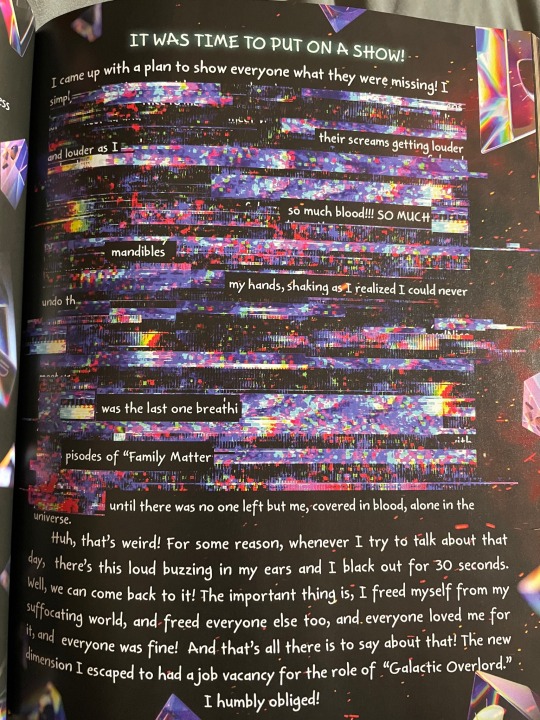
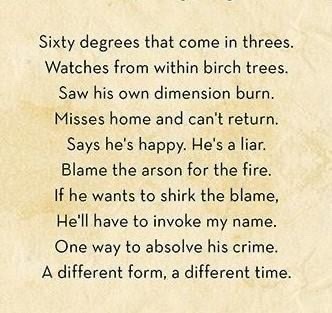
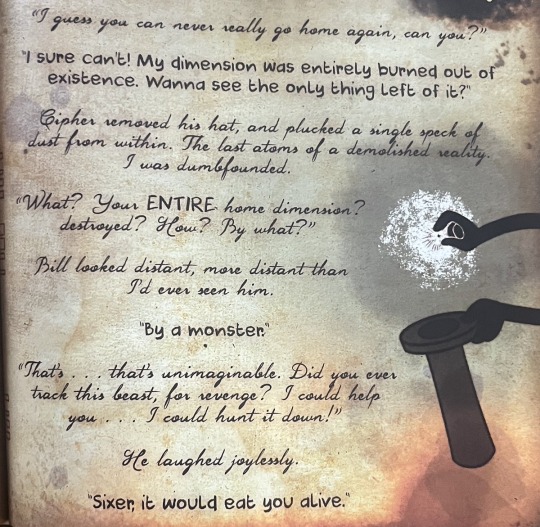
Bill has lied about this day on multiple occasions, and has also lied about how he feels towards it. He’s terrified to face the guilt— so he either pretends he did it on purpose and doesn’t care, pretends something or someone else did it, or pretends it didn’t happen all together.
While talking to Stanford, he calls himself a monster. This is what he truly thinks of himself. However, he pretends to be a different person than himself. His entire life past the day of his dimensions burning has been a lie of pure denial.
On top of denial, he refused and still refuses to grow up. After running off into a crumbling dimension with his “henchmaniac” friends, he started acting like a rebellious teenager. Unlike most villains with a specific intent to hurt, he went throughout the universe with the sole intention of having as much fun as possible. However, with his terrifying power and uncaring nature many casualties happened on the side. He’s guilty for them, and even finds some of them funny, but hurting people wasn’t and isn’t his MAIN intent. (At least not most of the time. He IS known to hold grudges, or dismantle someone’s face for fun, but those things aren’t part of his overall goal. Not saying they aren’t shitty, but his main intent is important to understanding his character and complexity.)
His main goal is to distract himself from his past with as much chaos as possible while also seeking attention from anyone he can get it from. He talks about Stanford and says he needs Bill to boost his ego, but really it’s the other way around. Bill considers himself a product to sell, he caters to people by using false charisma, pretending they’re the ones that need him when in reality he’s starving for their praise. He is desperate for someone to speak highly of him because his mind has nothing good to say, all the words he says out loud are compensation. He believes deep down that nobody will love him if they know who he truly is and what he’s done— and he’s not really wrong. And look! He couldn’t even admit that’s how he feels about himself so he pretends he’s giving advice! (He does this SO MANY fuckin times in the book..)
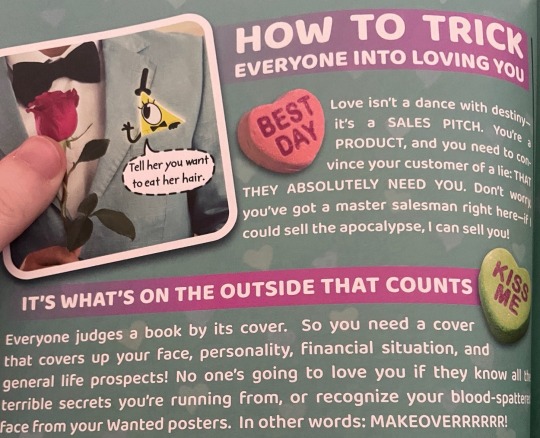
It appears in the book that the more he regrets or suffers from his past actions and traumas— the more he hurts and destroys the things and people around him as a distraction— all under the ruse of “partying”. So, in an immature attempt to absolve himself of guilt, he stacks more guilt onto his endless cycle by continuing to hurt those he loves again and again— pretending not to care but truthfully caring so much that he’d do ANYTHING to drown out the feeling. Ironically, his way of drowning out his feelings is by causing more harm. He is an endless, pitiful paradox.
It’s often misunderstood that he is a uncaring, but that’s what he WANTS you to think. That’s what he WISHES he was. His guilt and remorse doesn’t absolve him from the things he’s done, but the fact that it’s there is a GIANT and IMPORTANT part of his character. He CAN feel empathy, sympathy, sentimentality, and ESPECIALLY regret. He may be a considered a sociopath, but this doesn’t mean he’s not a person with feelings as well.
He’s so distraught over losing Stanford that he drinks himself into a state of temporary amnesia that made him fall into a ptsd episode— his memory is so bad he ends up thinking he’s talking to his mother who’s been dead for probably millions of years.
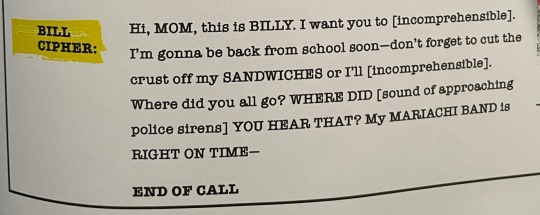
This doesn’t excuse what he did to Ford AT ALL (I felt a little sick looking at the knuckles page..) but you can’t truly understand his character without understanding that he is LYING when he is cruel to Ford. And no, just because it’s a lie/front doesn’t mean he’s absolved from saying or doing something horrible, but it DOES mean he is unique and complex.
It’s perfectly reasonable to not forgive Bill for what he did to Ford, because it’s not really forgivable— but I also think it’s fair to explore the complexities of “evil” characters. SAYING A CHARACTER REGRETS THEIR ACTIONS DOESN’T MEAN I THINK THEY DESERVE FORGIVENESS!!! Especially in Bill’s case, considering that he PRETENDS to not be sorry, which makes him terrible even if he doesn’t mean what he’s saying. He might as well not be sorry at all HOWEVER!! It’s still important to distinguish him from a sociopathic stereotype— so I have to acknowledge that he’s a little sorry anyway, even if that regret is hidden away and doesn’t help literally anyone.
He values his own comfortability over the people he loves. Meaning he’ll always be cruel instead of apologizing because even if he’s truly sorry, he can’t handle the fact that he did something wrong in the first place— He’ll just play dumb.
At the end of the day, though— Bill is much more complicated than “Guy that just wants to explode people with his mind and take over the world”— I mean yes, he’s also that— but he also has hella bad ptsd and possible other mental issues that I’m not qualified to diagnose. He has a mother who he misses and a pain he carries with him.
None of the pain he harbors will ever justify the pain he’s caused— So no, I don’t think he’s ACTUALLY forgivable (though I may joke). However, in my opinion, I do think he’s redeemable! He’s going to live (or at least be in purgatory?) for millions of more years. He already got a punishment of literal death and has the empathy (somewhere) to continue forward and start fresh. He has thousands of years to heal from his trauma and wallow in what he’s done.
The Pines family may never forgive him, but out of the child-cartoony love in their hearts they offer him not forgiveness— but live and let live. (Well, at least Mabel does.. love you sweet girl.) If he goes around them they’ll beat his ass like in weirdmaggedon, but if he stays away, they will too. At the end of the day, he’s been stopped and they’re happy. If he is alive, (((or is going to be??))) he might as well heal.
And, well.. even if you think he doesn’t deserve that somewhat happy(?) ending, a redemption arc for him has been hinted at for years. Sorry, man. Respect to you and all but like… friendship is magic and the evil demigod is gonna start working at your local wendys once he’s outa space arkham. It’s just the way kids shows go, man.
(((Edited note: I apologize for my original wording when it came to “sociopath”— I wasn’t aware of its actual medical use and I should’ve done my research on that! I’ve changed this post to be more accurate in that regard, so if old reblogs look different it’s because they’re the original version.)))
616 notes
·
View notes
Text
it’s simple and it goes like this | steve harrington x reader
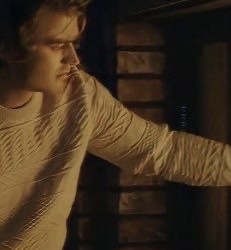
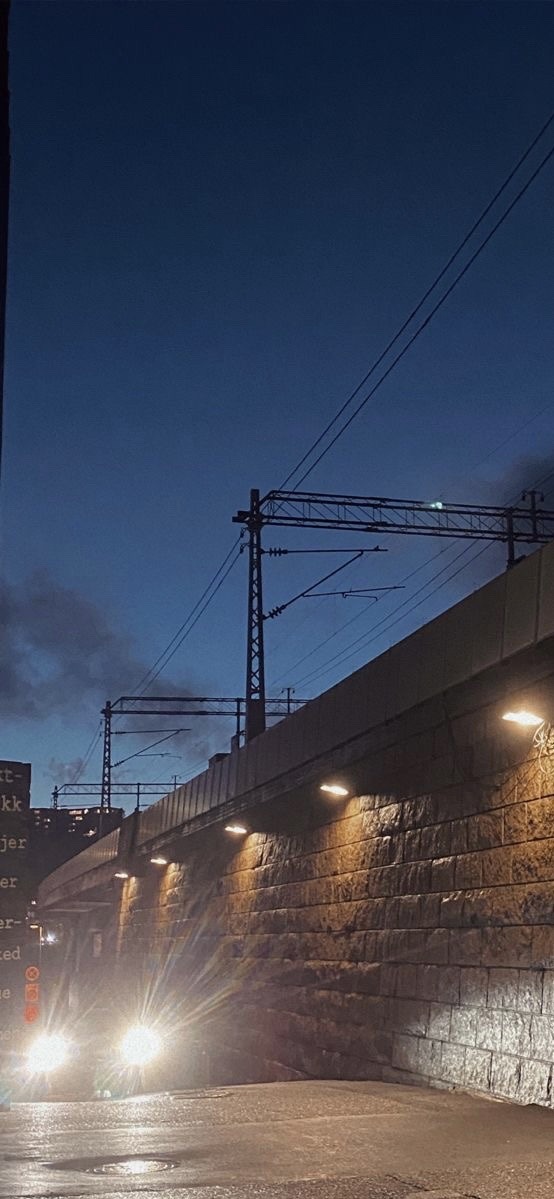


a/n: thank you in advance to anybody who reads this little labour of love, i’ve had such a great time writing this one and i’m so proud of the finished outcome. title from i’m in love with you by the 1975. 6.1k words.
tw: EXPLICIT CONTENT 18+ MINORS DNI, reader uses she/her pronouns and has female anatomy, piv sex, oral f receiving, creampie, soft sex, dirty talk. intoxicated characters, admission of feelings, angst and fluff. characters ages are around mid-late twenties.
summary: turning down a ride from your roommate and brotherly figure, eddie munson, in favor of staying behind at a christmas party ends in you finding an unexpected escape in steve harrington. a drive home and copious amounts of flirting later, the night unfolds in passion and letting out unspoken feelings, leaving you to grapple with the consequences of the choices made.
Staying behind at Jon and Nancy’s Christmas party had been a mistake, and only now, inhaling nicotine into your lungs without a clue on how to get back home, did you realize the weight of this mistake and how badly you wished you could rewind to an hour prior when you had a guaranteed ride.
Eddie offered you a ride home when he was heading out, which you declined immediately. His girl, Heather, really wasn’t overly keen on you, and would do anything to make the journey home as painfully awkward as possible.
You and Eddie had lived together for a few years now, the bond between you both knitting together so tightly, so much more than just shared rent and somebody to talk to at night. He became the first person you went to for everything, and you’re sure he felt the same, finding comfort in each other in a way that could only be described as a sibling bond. As much as you loved him, would do anything for him, he wasn’t for you, and you weren’t for him.
Eddie was just trying to look out for you tonight, be protective in that typical brotherly way, and make sure you got home in one piece.
You mentally kick yourself for being a moron and placing your discomfort at sharing a closed space with his girlfriend above your safety.
Standing outside as the rain starts to pelt down and seep into your skin, you’re regretting your decision. Heather was an ass, but dealing with her for a twenty minute car journey would’ve been favorable over standing outside in freezing temperatures, getting soaked to the bone.
You stub out what’s left of your barely lit cigarette, crushing it under the heavy weight of your Docs. You scan the deserted street for any sign of life, only for whatever forces that are in charge to offer you some form of rectitude — Steve Harrington’s car hums in the distance, lights illuminating the otherwise empty road.
The Beemer rolls up, Steve’s arm flexing as he rolls down the window, “Need a ride?”
Steve’s eyes are hazy, a flash of mischief shining in his dark honey hues — he’d spent the majority of the party with Eddie, the pair of them suddenly the best of friends after years of teenage hatred. He’s so high, you can smell it on his expensive jacket.
Eddie’s disappointed face flashes through your mind, but the heavy material of your own jacket clings to your body, soaked through from the pelting rain. Fuck what Eddie would think, getting in Steve Harrington’s car beats whatever was going on out here.
“Yeah, thanks,” you mumble, a sharp little smile on your face as you round the car, sliding into the passenger seat. The door slams shut and you’re suddenly cocooned in familiar scents of leather and Steve’s cedarwood cologne. It’s painfully comforting.
The engine roars to life once more, and Steve makes off down the street without another thought. You pretend not to notice how his eyes hardly leave your soaked frame as you drive on.
The car purrs as you drive down the quiet streets, the unspoken tension between you both almost suffocating as Iron Maiden plays softly from the speakers. Eddie really made sure Steve saw all parts of him when they began hanging out, and Steve took to Eddie’s music tastes painfully quickly.
“What’s the story then, princess?” Steve grins, finally breaking the silence, “Turning down a ride with Eddie for a nicotine break was a little silly. It’s freezing out there, you’d have caught your death if I hadn’t shown up.”
“My knight in shining armor,” you deadpan, sighing quietly and cringing when you catch yourself being a little rude, “sorry, uh. I didn’t wanna be a third wheel, Heather and I, we don’t get along at all.”
Steve chuckles quietly, “She’s a bitch.”
“She’s such a bitch,” you agree with enthusiasm, finally turning slightly in your seat to face Steve properly, “I dunno what the hell Eddie sees in her.”
“Big boobs,” Steve shrugs, making a face when you hum in disappointment under your breath, “fair point, though. Can’t blame you for wanting to avoid that situation. Still, I can’t believe he left you there like that.”
There’s a beat of silence, your cheeks flushing hot. Was Steve being protective?
“I saw you dodging advances from a certain somebody tonight,” Steve wiggles his brows, cutting the tension quickly, “what’s the deal? He not doing it for you anymore?”
You groan, rolling your eyes as you slump back into your seat, “I’m not in the mood for Brad’s games, y’know? He’s so hot and cold.”
“Games, huh?” Steve grins, eyes landing on you for a moment, flirty and devastatingly attractive, “Maybe you’ve just not found somebody yet who plays the right ones.”
You flush hot, heart practically beating out of your chest, because this is clearly the weed talking. Steve hadn’t flirted with you since that one time in sophomore year, when you’d come back from Summer break and had blossomed enough for the one and only The Hair to find you worthy of his time.
“Smooth, Harrington,” you choke out eventually, spluttering on your own saliva as you struggle to get the words out, “your list of admirers is endless, do you use that line on all the girls?”
“Just the devastatingly pretty ones.” Steve passes a lingering glance over your body, only to look away and avert his eyes back to the road before you can say anything further.
Over the years you had known him, you and Steve had shared stolen glances and sly, flirty smiles. Gravitating towards each other in Eddie’s absence, but never pushing that boundary. Steve had a list of conquests, and it pained you to admit every last one hurt to watch – somehow it pained you more to admit how pleased you’d become when each of them left just as fast.
You both knew that these were dangerous waters to tread, how protective Eddie could be over you was enough to have Steve keeping you at arms length, his respect for Eddie was the determining factor. Yet here you were once again, sharing a confined space and feeling an aura of comfortability that couldn’t just be ignored until it went away.
The rest of the journey passes in silence, and all too soon Steve is pulling onto the dirt track towards the trailer you and Eddie share. The place is still in darkness, and you have to suppress an eye roll – Eddie was hardly ever home overnight now, too used to shacking up with Heather in her apartment in town.
Steve cuts the engine, slapping a hand down on his jean clad thigh, “I’ll walk you to your door, it’s creepy as hell out here in the dark.”
He shudders for emphasis, and before you can protest and tell him you can manage on your own, he’s out of the car and rounding the trunk to open your door for you.
“Thanks, Steve, you really don’t have to.” You insist, stepping out of the car and internally cringing as your boots squelch in the thick mud where the tyres of Eddie’s van typically embed themselves.
“It’s okay, wouldn’t wanna risk something happening to you,” Steve says, a hand coming out to just barely touch the small of your back as you struggle like bambi on ice in the slippery mud, “here just – just take my hand.”
Steve extends his hand out and you take it with a slight hesitation, your need to make it to the front door without being soaked in rain and mud outweighing the heavy feelings sitting in your chest.
It’s almost frightening how normal it feels, to have your hand clasped with Steve’s as you walk the short path to the trailer. You don’t want to know what that means, but it feels so nice, the way Steve’s large, warm hand encapsulates your own has your head spinning.
You have to, albeit sadly, let go of Steve to fish in your jacket pocket for a front door key. After a fight with the lock, the door swings open, the warm heat so inviting that you basically barge through the doorway, tugging Steve in with you without thinking.
Steve gawps a little, flounders from where he stands as you lean over his large frame to shut the door behind him, toeing off your shoes like you would any other night. When you finally take a moment to realize what you’ve just done, so casually, you’re suddenly aware of the slight crackle of tension, the rain-damp heat radiating from your bodies as you shuffle close together.
You guide him further into the house, flicking on a lamp that’s perched on a nearby table, illuminating the room with a soft, warm glow. Losing your jacket and throwing it haphazardly on a random surface.
Neither of you pull away from each other, either, walking as tightly together as you can manage in the small space.
“You want a drink or something?” You ask, trying to keep yourself as nonchalant as possible, schooling your voice as you cast a sidelong glance at him.
Steve grins, a glint of mischief in his eyes, as he gently declines the offer with a shake of his head, "As tempting as that sounds, princess, I spotted a little note from Eddie saying he'd be back soon. Wouldn't want to overstay my welcome and have him play a game of twenty questions.”
Your confused gaze follows his where he nods over your shoulder, and sure enough there’s a scribbled out note on the pin board hung up the wall;
BE BACK SOON SWEETHEART, DONT LOCK ME OUT!!
You really do roll your eyes this time around, mentally sticking the middle finger up at the fucking note. You walk back and lean on the dining table, crossing your arms over your chest. You can’t pretend that you don’t notice Steve’s gaze never leaving your body, watching your every move as you shuffle around.
He looks disappointed, shoving his hands deep into his pockets. You dare to fix your own stare on him from where you’re perched, can’t ignore how he so naturally hovers towards you despite the rejection. Like he wants to do one thing but is saying another, trying to be the good guy.
Steve was a good guy.
In the closeness, this thing between you and Steve becomes devastating. The air is thick and whatever sort of invisible barrier you had between you both begins to fade as you float into each other's space.
With a nod of his head towards the door, Steve finally breaks the silence. "Guess I should get going, huh?"
The words hang in the air, a question that Steve silently demands a response from, leaving you to decide which it’s going to be.
A soft smile plays on your lips as you respond, "You could stay, you know? We could… hang out."
You offer with some sort of nonchalance, despite how your heart hammers in your chest, leaving the choice in the hazy space between lingering and leaving.
Steve sucks in a slow breath, his eyes flickering between yours and the curve of your lips. You shiver visibly, and in that fleeting moment, Steve inches a fraction closer. It's a subtle movement, almost imperceptible, but it speaks volumes.
Up this close, you could really marvel at just how gorgeous Steve is, his tan skin flecked with beauty marks and moles, dotted like constellations. You wanted to connect them all with your tongue, kiss and bite him until he was branded.
“You want to, right?” You breathe, chest heaving slightly, and you forget all about how damp and uncomfortable your clothes are, how when he picked you up you wanted nothing more than to have a hot shower and go to sleep. Now, you want everything but that. You want to see how far Steve will go, you want to know if he wants you as much as you want him.
“Eddie’ll probably be back any minute,” Steve murmurs, those deep set eyes scanning over your entire face, lingering on your lips, and the tip of his tongue peaks out to swipe along his own bottom one, wetting it, “we… we shouldn’t.”
“Yeah, we shouldn’t,” you agree eventually, voice breathy and lacking conviction, entire body vibrating, leaning into Steve just as much as he was leaning into you. Your hands grasp for the edge of the table, grounding you when you need it most, anticipation enough to have your heart hammering in your chest.
“Yeah, we… definitely shouldn’t.” Steve mimics, leans in closer, his hot breath fanning your face. He’s beautiful like this, so close that you’re going cock eyed trying to keep your vision of him clear, but his guard was rarely ever let down around you, and you didn’t want to miss a moment.
His lips brush against yours, a pained, strangled sound coming from the back of his throat, before he’s diving in for that first mind melting kiss.
Time stops for a moment, this fiery spark finally igniting between you both as your mouths move against one another, painfully desperate like it’s going to be over too soon, like if you stop it’ll never happen again.
All inhibition is lost, Steve’s fingertips squeezing into the doughy flesh of your waist, somehow pushing you together even tighter, gripping you with a fierceness as your lips move together. Like he’s staking a claim — mine, mine, mine.
His tongue swipes against your bottom lip, begging for entry silently, which you allow him willingly with a high pitched, contented moan. He’s experimental, swiping the tip of his tongue against your own lightly, lapping until he’s pulling these little noises from you, and it has your core aching.
The light smacking sounds of moistened lips in an otherwise void room is an almost painful reminder that this was real.
Your shaking fingertips move from the table to grip at the front of Steve’s jacket, desperate hands trying to rip at the material, because a simple kiss was never going to be enough. Now that you had him and knew he wanted you back.
“We can’t,” Steve whines, pitiful against your lips as you struggle to stop, chasing his mouth with your own in a feverish passion as he barely tries to pull back from you, “you keep making these noises, m’not gonna be able to stop.”
You bring your hands up to cup Steve’s jaw on instinct, without even thinking about it, holding him in place so he can’t fight with himself to get away, “Want it, Steve. I want you,” you breathe, sincere and pleading, guiding him back to kiss you again and he melts into you, “wanted it since the first time you stepped foot in here. Wanted you to want me too.”
“Always fuckin’ wanted you,” Steve mumbles, those soft, fucking perfect lips brushing yours as he speaks, so desperate it’s like he can’t bare to move back any further, “you’re so beautiful, shit. Need you, can I have you?”
You nod without hesitation as Steve's hands tighten on your waist, intensifying the urgency between your bodies. The kiss deepens, a mix of desperation and desire, creating a raw, feral, and unmistakably intimate connection.
Steve's lips become a drug, setting off sparks within you, Breaking away, his admission of always wanting you turns that spark into an all out wildfire, and his calloused fingertips trace over your flushed skin as he murmurs, "Wanna do that forever," he murmurs, taking a moment to lock eyes with you, before reconnecting your lips.
A desperate groan escapes Steve's chest, raw and needy, twisting your gut in knots. His fingers dig into your waist and jaw, revealing that internal battle he’s clearly still fighting – wanting you intensely but also grappling with the fear of the irreversible damage you’re about to do.
You do nothing to hide your desperation for him, hands tightly clinging to his jacket, showing him just how much you want him.
Trying to get him to stay and stop overthinking everything.
Steve's silent plea transforms into a primal growl as he pulls you closer, pressing you up so tightly against the table that your ass mounts it properly — you willingly spread your legs for him, allowing him entry so that he can slot between your thighs.
Whatever boundaries you were trying to keep are long gone.
“You’re soaking, baby,” Steve notes, the tip of his tongue swiping along your bottom lip, “you need to get out of these clothes.”
“You think you’re so smooth,” you giggle, the delicate sound pitching into a moan when Steve dips down to mouth at your jaw, “think I’m soaked in more ways than one.”
Steve grunts against your skin, his teeth grazing against the side of your throat. He rocks his hips into your own, and you have to suppress an embarrassing sound when you feel the half hard outline of his cock press against you.
“You gonna be a gentleman and take me to my room?” You tease, fingers traveling from Steve’s jacket and up into his hair, nails tangling in the tresses and tugging him closer. You relish in how he finally bites down on your skin properly, determined to mark you as his own.
“What if I wanna do it right here, huh?” Steve mutters, kissing over the raised, abused skin on your neck, “You want that, princess?”
You nod, just once, a deep heat pooling in your gut, and that’s enough to have Steve pulling desperately at your dress. Calloused fingertips slide the spaghetti straps down your shoulders, and you help him take you out of the offending material, shimmying until it pools at your feet.
Steve groans, low in the back of his throat as he takes in your body, now barely covered by a skimpy black thong and a lacy bra. You burn hot under his intense gaze, squealing when his large hands snake under the backs of your thighs, kneading the fat between his fingers as he hoists you back onto the table.
“Can I use my mouth on you?” Steve mumbles, massaging your thighs that you willingly spread open for him once again, a silent invitation.
“Y-yeah,” you stutter, moaning when he drops to his knees in one fluid motion, wrapping your legs around his shoulders as he goes.
One thing that is apparent, is Steve’s love of eye contact. Touching you everywhere his body can reach, and it drives you up the damn wall. His eyes are darkened with lust as he trails hot, wet kisses up the insides of your thighs, pushing your legs apart further so he can slot his broad shoulders in the space.
The anticipation bubbles deep in your gut, cunt fluttering as he dips two fingers into the material of your panties, pulling them to the side to expose you to the warm air. You feel him squeeze you tighter, gaze moving to take in the sight of your slick pussy, ready and waiting for him.
“Mmph, she’s so pretty,” Steve moans, leaning forward in an instant to bury his face into the wetness of your cunt, running his nose over the bump of your clit as his tongue snakes out to taste you, lapping messily.
“Steve!” You gasp his name, fingers immediately finding home in his honey highlighted tresses, sinking in and tugging lightly, pushing him closer to you.
It spurs him on, those fucking hands squeezing and pulling at the flesh of your inner thighs hard enough to bruise, burying his face into you deeper and grunting like you’re the best thing he ever tasted. He’s messy, lapping up and down the expanse of your core, suckling on your clit with a perfect pressure.
“Shit, shit,” you’re basically wailing, hips rolling into Steve’s face and he just takes it, lets you guide him with your hands, moving him where you want him to go.
He never breaks eye contact, watches you with these hazy, pussy drunk eyes as he gives you everything you want and more. Moaning into the heat of your cunt like he’s getting off just as much as you are.
“Keep doing that, m’gonna cum, haa,” you’re babbling, incoherent as your tummy rolls with sheer pleasure, Steve never once letting up on his assault with his tongue.
If anything, your words have him doubling down, pressing in so far you’re not sure he’s even able to breathe. Your orgasm hits you suddenly, violently, has you pulling on Steve’s hair so hard you know his scalp has to be aching, and you finally squeeze your eyes shut tight as you ride it out.
You know you’re gushing for Steve, making a mess of his face with the slickness that spills from your cunt, thighs shaking and locking him in tight in the aftershocks. He doesn’t let up until you’re physically jerking away, fingers running through his hair softly as your hips shudder.
You’re barely on the same planet, unable to comprehend it when Steve rises from between your legs and kisses you deeply, feeding the taste of yourself to you. You moan, hands coming up to squeeze Steve’s face as you deepen the kiss, swapping spit and rocking against each other.
It’d be disgusting if it wasn’t so erotic.
“You’re so hot,” Steve moans, pushing into you until the curve of his clothed cock presses tight into the cavern of your soaked cunt, eliciting breathy whines from you both, “need you now, yeah?”
You nod, and he’s pulling you from the table in an instant.
Clothes scatter along the floor as Steve takes you to the bedroom, practically carrying you like you’re nothing. Neither of you leave an inch of space between each other as you rip his shirt over his head, tugging at the offending leather belt that keeps his jeans in place.
“Off, need them off,” you gasp, finally popping the button and burying your hand into his underwear. Tackiness on your fingertips from where the head of his painfully hard cock has been pressed tightly in the confines of his clothes.
Steve chuckles, pushes his hips into your hand and you finally get to feel him. Hot, hard, heavy in your hand — big enough that your eyes widen, and he’s burying his face in your neck to hide his embarrassment, biting at your shoulder.
“Didn’t get called King Steve for nothing,” he mutters, a red flush on his cheeks that he buries in your skin.
“The girls weren’t kidding.” you gasp, wrapping your hand around what you can reach and tugging slightly until he’s bucking into your grasp.
You’re pushed through your bedroom door, backs of your knees hitting the end of the bed unexpectedly. You bounce back onto it, pulling Steve with you, a tangle of limbs on an unmade bed that smells vaguely of the vanilla perfume you’d sprayed earlier.
“Couldn’t let a guy get his pants off first?” Steve grins, pulling back and looking physically wounded as he does it, to shimmy out of the remainder of his clothing.
In the soft lighting, he looks ethereal. The moles and beauty marks are everywhere, branding perfectly tanned skin, a soft tummy that just barely conceals a set of abs. He’s perfect, like a wet dream, and here he is in your room, in your bed, crawling back between your spread thighs.
“You’re so perfect,” Steve sighs, leaning down once again to capture your lips in a searing kiss, his torso rolling into yours as he steals your breath from your lungs.
It’s everything. The way you move together like you know each other's bodies perfectly, touching each other with a familiarity despite this being the first time.
A hand crawls up your inner thigh, and two deft fingers sink into your cunt, crooking up and finding that spot, running against it until you’re arching under his touch.
Your own hand crawls between your dancing bodies, wrapping properly around the length of Steve’s cock, tugging half heartedly until he’s growling into your mouth, his hips punching forward into your touch.
Time passes like molasses, it could be two minutes or twenty, until you’re both gasping and desperate. Not even kissing anymore, just lightly panting with brushing lips.
“Want it, want you to fuck me now.” You beg, clenching around Steve’s fingers for emphasis, cunt soaked and fluttering, needing more.
Steve nods, sliding his fingers from inside of you, understanding every word and desperate plea. He clasps your hand in his own, bringing them up to rest beside your head in the nest of pillows, “You ready, baby? I’ll take it slow, know I’m a stretch.”
You nod, any witty remark dying in the back of your throat. The want and hunger for Steve overrides any other feeling, your brain fogged with nothing but him and his body tight against yours.
Steve grasps hold of his cock by the base, head bowing so he can watch as he presses the head snug against your cunt.
You both inhale a shuddery breath at the same time, and suddenly he’s pushing in — inch by inch filling you out. You whimper, fingers digging into Steve’s, a mewl escaping you as you push up into his torso.
Steve looks up at you, sincere and checking in, “You okay?”
“Keep going,” you gasp, hips swiveling.
Steve’s mouth hangs open in a silent moan, watches as his cock slides into your wet pussy like it was made to be there, taking every last inch of him until he’s nestled up against you.
You jolt when the thick thatch of hair nestled at his pubic bone catches on your swollen, throbbing clit. A breathy, panting whine clawing up from your throat.
“Fuck, you’re so fucking wet, princess. Not gonna last long,” Steve admits pulling out a few inches only to slide right back in, making home, “god, like you were made to take me.”
You flush at Steve’s words, “You can– you can move properly. Fuck me like you want.”
“Don’t say that, princess.” Steve whines, fingers gripping your hips, “You let me have what I want and I’ll never let you leave.”
Your heart beats faster, harder, whole body alight with all these different feelings, tugging at every part of you.
Full on Steve’s cock and holding his fucking hand. It’s heavenly.
Steve pulls out properly this time, pushing back in and creating a punishing rhythm that has you mewling and spewing out these horribly loud moans and cries for him. The head of his cock nudges at your spot dead-on with each thrust, has you over-stimulated ridiculously fast, it teeters on the right side of painful.
Your fingers dig into Steve’s skin, other hand wrapping around his bicep. A moan escaping you as he dips down to kiss and nibble at your neck, “You’re so big, holy shit. Feels so good, so good.”
“Yeah?” Steve grins at you, cocky and sure of himself and you almost catch a glimpse of the old Steve in it, which somehow makes the entire thing even sexier. One thing Steve Harrington was so sure he was good at was fucking, and you feed into his ego with the way your body reacts to him.
Sweaty skin slapping against skin, the creaking of your bed frame under the vigorous movements. The pants and cries that flow from your mouth with every hard thrust, the grunts that rattle from deep in Steve’s chest. It’s pure filth, everything you wanted and needed.
“Y-yeah, I— I—” You stutter as your orgasm crescendos, legs wrapping tightly around his waist, heels of your feet digging into the small of his back. Nails breaking skin on Steve’s arm as you shake and shudder through it, body practically vibrating with the sheer force of it.
“You needed that huh, princess? Needed me to pull that from you?” Steve whispers, a moan leaving him as he fucks you even harder, chasing his own orgasm, “Fuckin’ gripping me, holy fuck.”
Your eyes roll into the back of your head, unable to stop how your cunt flutters sporadically for him, taking everything he gives you and then some.
“Holy shit, baby,” Steve breathes, fucked out and chest heaving, “m’gonna cum, gonna cum in your perfect little pussy.”
“Please,” you beg, back arching and somehow pushing Steve in even deeper, eliciting matching moans of pleasure from you both, “please, please.”
“Shit – fuckin’ begging me to cum in you, you’re so perfect, shit.” He grunts, hips slamming into you as he nears the end, thrusts becoming short and snappy, rhythm faltering.
Your nails dig into Steve’s bicep, pushing your nose against his softly, ghosting a kiss over his lips, “Wanna feel you spilling in me, please? Mark me, I’m yours.”
He moans loudly at your words, the noise so beautiful it’s like music in your ears. You’d almost be smug about being the person to pull it from him, if it weren’t for how fucked out he’d left you.
Steve squeezes his eyes shut, pushing his face into your neck as his body wracks with his orgasm. He grunts into your damp skin, cock pulsing rhythmically inside the fluttering walls of your pussy.
You can feel it so fucking strongly it’s almost hard to breathe.
It’s sticky and messy as Steve untangles his sweaty limbs from your own, landing a gentle kiss on your nose. You flush hot, burning up at how ridiculously domesticated the simple motion is.
He pulls out sloppily, flopping down next to you on the bed and hauling you into his warm embrace. It’s — it’s unexpected, so soft and sweet that you tense for a second only to loosen up and settle your head on his chest.
The air is heavy and warm in the afterglow. Steve's gaze lingers on yours, shared silence and panting breaths, acknowledging your mutual feelings without a single word.
You’re leaning up to kiss him again, unable to contain it, when suddenly the bubble is shattered, the bedroom door swinging open abruptly.
Eddie stands in the doorway, his features screwed up with a mixture of shock and anger.
"Steve, what the hell?" Eddie's scratchy voice cuts through the stillness, his eyes narrowing as they dart between you and Steve. Steve bolts upright, panicked and caught off guard, shifting uncomfortably under Eddie's intense gaze.
"Eddie, I can explain," you begin, panic rising in your chest as you sit up and pull the sheets closer around you. Your eyes lock on one another’s, and Eddie's expression tightens further.
"Explain? Explain what, exactly?! That my best friend is in bed with my-my – dammit dude, she’s like a sister to me! What the hell?!" Eddie's tone is sharp, a mix of disbelief and fury. Steve runs a hand through his disheveled hair, clearly searching for words that could help calm the escalating situation.
"Eddie, it just happened. We didn't plan—" Steve starts, but Eddie interrupts with a held up ringed hand.
Neither of you push it any further, words dying in both of your throats at such a simple movement. You’re so far apart by now that Steve is basically hanging off the edge of the bed, and you can’t help the way your heart feels fucking heavy with it.
"I don't care. This is not okay. I told you not to touch her, Steve. She’s not a girl to play with." Eddie's disappointment is palpable, the weight of his words hanging heavy over your head.
There’s a moment of devastating silence, broken only by echoes of Eddie's anger and the heavy weight of his boots shuffling along the hard floor as he walks away. The trailer door slams shut so hard that the entire shell ricochets with the force.
It all becomes so painful once Steve hauls himself off of the bed, frantically throwing on every strewn article of clothing that he’d shed just hours earlier, his head bowed like he can’t even bear to look at you. Like he’s scared and doesn’t want to face up to everything that happened.
You can’t even blame him.
“Steve, wait,” you start, vision blurring at the edges as panic starts to set in, grappling to come to terms with the fact this was all going to be over, “don’t listen to him. He’s wrong, I know you – you don’t. You don’t do that anymore, you wouldn’t do that to me.”
“No he – he’s right,” Steve’s eyes reflect with sadness, the weight of his words lying deep in the pit of your stomach, “I have a reputation. We all know that. He’s trying to protect you, his heart is in the right place.”
“But Steve-”
“Eddie’s right, princess. There’s something there, I know it. But,” Steve sighs, shaking his head, “if this doesn’t work out I lose you and him. I can’t risk not having you both.”
“Steve, will you listen to me, please?” You plead, clambering in a moment of panic to get off of the bed, sheet still wrapped firmly around your naked frame. You shuffle over ungracefully, until you’re standing toe to toe with him, “I like you. You felt it like I felt it. I– I want this.”
You can almost see Steve’s internal struggle, the way his face crumples once he catches your teary eyes with his own devastated hues. His hands itch at his sides, and then suddenly those strong arms are wrapping around you, pulling you into his orbit and lifting you onto your tiptoes.
You wrap your arms around his middle, fingers grasping at the stretched material of his shirt, clinging on for dear life, "Steve, I really fucking like you, and I can't stand by and watch you walk away from this because of some misplaced sense of loyalty.”
Steve’s chin rests atop your head, and you feel every bit of the deep sigh he lets out, “You trust me too much, like you know I’m not going to fuck up. I wish I could trust myself even half as much.”
Your reaction is immediate, frustration bubbling up inside of you as you listen to Steve talk down on himself, “You’ll never hurt me. You’re not some ticking time bomb just waiting to ruin everything. Allow yourself the courtesy of taking what you want and letting yourself fuck up. I’m strong enough to handle it.”
“I’ve messed up so many times in the past that I’m scared I’ll hurt you without meaning to,” Steve winces, clinging to you even tighter, cocooning you in his embrace, “I couldn’t live with myself if I did that shit.”
You pull away slightly, bringing a hand up to cup his jaw, forcing him to face you and really soak in every word you say, “You’re fucking human, Steve. I’m not asking you to be perfect.”
Steve’s face etches with vulnerability, those damned eyes filled with hurt, but his body relaxes slightly, acknowledging what you’re trying to say, “You’re perfect.”
Your stomach lurches, heart hammering where it sits beneath your ribcage, this pathetic grin taking over, “I promise you, I’m not. Wait until you realize just how many flaws I have — like being so terrible at cooking that I burn toast.”
Steve lets out a snort, eyes crinkling in the corners, fondness washing over him, “I’ll teach you,” he mumbles, leaning in a little, “if you’ll teach me something in return.”
“Anything.” You breathe, pushing up to bridge the gap. Your noses brush, Steve’s hands gripping onto the soft flesh of your waist a little firmer.
Steve grins, mischievous, “Teach me how to have patience. I’ve been told it’s a virtue I’m seriously lacking, Dustin rags on me all the time about it.”
You let out a soft laugh, the tension from earlier dissipating in an instant, "Patience it is, though I’m not sure how much of it I even have. And you better be ready for some burnt toast along the way."
Steve chuckles, a low, melodic sound that sends shivers down your spine, "I think I can handle that."
He bridges the gap between you, pressing his lips to yours and sealing the agreement.
#steve harrington fic#steve harrington x reader#steve harrington smut#steve harrington fanfic#steve harrington x you#my fanfic#mine#x reader
2K notes
·
View notes
Text
Norm is absolutely one of my favourite characters in the Fallout universe. The fact he loves his family and wants what's best for them being what drives him to look for the truth of what has happened to them and why is fantastic. The ultimate difference between him and Chet, too, is a great show of his character. It began with him choosing to help his sister find their father and ends with him coming to the same realisation as she has – their father was not the man he said he was and much of their life has been a lie. Watching him decide to take the hunt for the truth into his own hands, even when it could be the end of him, is incredibly compelling.
What makes Norm so enjoyable to watch, too, is just how human he is. All of the characters in the show are that way, which is part of what makes it great (yes, even the ghouls as they were at one time human). The distress he feels at seeing what happened to Vault 32 being swept under the rug, and the anger he feels towards Betty and the others for doing it seemingly out of a desire for control and power more than anything else is tangible. The fact it drives him to take the risk of sneaking into Vault 31 shows his bold and couregous side, and also that it's driven by not only his own curiosities but his desire for the truth. It’s a great parallel trait he shares with Lucy and, as she comes to find out, their mother. The anger he feels towards his father and also the desperation he feels to survive are a great contrast of his truth seeking and his baser humanity.
All things considered, Norm's competing feelings of a desire for truth, a desire for safety, curiosity, and a love for his family are what make him a great character. The fact he shares those traits with Lucy but expresses them in different ways creates a strong parallel narrative for their characters, and also does a great job showing the two sides of courage. The fact neither he or Lucy are impervious or shy away from moments of weakness and subsiming emotion latch onto the naivety from their upbringing and also their humanity. With them both now having to reckon with the truth about their father, a reunion between them will I'm sure be great and also remind them that not all of their family members are bad. Reckoning with the truth about their mother and Lucy's love for her being what compelled her to end her suffering before breaking down at the gravity of it is another layer of complexity to their family dynamics that both of them will need time to sit with. The contrasting feelings of how they knew their father versus what they've come to learn about him serve well to separate them from others like Chet; where he, their cousin, chooses to remain wilfully ignorant, they chose to put aside their fears and look for a truth they knew was out there.
Chet is a coward because he chooses to ignore the truth he has seen with his own eyes.
Lucy is brave because she is willing to go to any and all lengths to find her father and is then willing to end the suffering her mother is under because of him; she is openly emotional and driven by that and the love she feels for her family and is horrified and shattered by her father being a different man than the one she had always known.
Norm is brave because he is willing to do anything for his sister and father and, when faced with the choice to stay in blissful ignorance, because he chooses to seek out the truth even when it could hurt him; he, too, doesn't shy away from the pain the truth about his father causes him and, like Lucy, has to learn to live with the competing memories of their father and the reality of who and what he is.
Hank is a coward because, while he goes to the extremes to attempt to preserve himself and his family, he refuses to accept the fact his actions have consequences for the way his children (and, previously, their mother) had seen him and instead tries to force things to go back to the way they were before his children could learn of his ability to be selfish.
And Rose was brave because she loved her children so much that she would and did do everything for them, even when she had to put her love for their father aside and risk herself so that she and her children could have a chance to live in truth rather than lies. Her children share that with her, even though they didn't know it, just as much as they share her love, empathy, and desire for the truth even when living in wilful ignorance could have been easier.
Tl;dr – the entire MacLean family being driven by love for each other but expressing it in different ways that ultimately drive them apart is not only great at showcasing the different sides of courage and cowardice but showing the way Lucy and Norm are so similar and are driven by their love for their family just as much as their desire for the truth and that neither Lucy or Norm shy away from their emotional and impulsive reactions to it presents them as not only fully human but two sides of the same coin; they are both couregous even though they take two different paths to the truth.
#fallout#fallout on prime#fallout prime#fallout tv#fallout tv show#fallout tv series#fallout tv spoilers#fotv spoilers#fotv#lucy mclean#lucy maclean#norm maclean#hank maclean#rose maclean#chet maclean#lucy fallout#norm fallout#fallout analysis#fallout stuff#fallout show#fallout spoilers#fallout series#fallout things#fallout the series#fallout the show#fallout thoughts
523 notes
·
View notes
Text
Last time I did this it was a year ago, but a cubito has reached blorbo status after so long + he's barely talked about on the maintag along most of the Teal Titans. Here I come with blue faction rep.
It's time for a tr!Scott BIG ramble, more under the cut.
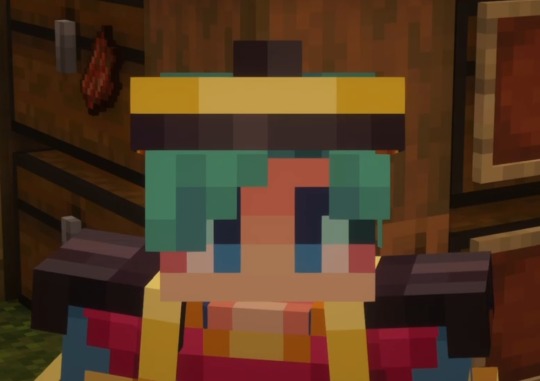
I got myself on a mission recently, the mission to watch Scott's POV of The Realm, and I just got done with all the available VODs today (if he was present in-character on more VODs from other streamers while off-stream, I have no clue which ones specifically).
From the get go, tr!Scott's lore is very interesting. He was established as someone who just spawned in, as a giant snail, and according to his own words (paraphrased): ''It's all very cloudy, I know that I felt a strong will to kill you, but strangely the need to distract you with baby sensory games at the same time.''
The three hours of scuffed snail fight with the Teal Titans were applied into his first memories. They bonded over that and he acted upon that since.
Plus, the entire cloudy and mixed feelings/wills during this fight sparked the headcanon/theory of mine that goes: The Keepers brought the people that fought as the snails to the Realm and applied some sort of magic that turned them hostile and willing to kill their opponents. But Scott was able to kinda get through some of that magic, for reasons unknown, which allowed him to bond while that will to murder was not 100% disappearing.
Again, this is not canon nor confirmed, it's my interpretation until proven differently by the lore, if this ever gets brought up again at all. It's a theory based off the books tr!Bekyamon found too and I highly recommend to read them.
Back to Scott, he was automatically sorted to the Hostile Faction aka the Reds. But from his very first day after the snail fight, he was making very clear statements that he had no allegiances at all with the red faction and he felt more comfortable with the blue faction thanks to those hours of bonding they went through. He did not care if people called him unloyal to the Reds or if they pointed out that he spent most of his time with the Teal Titans, because he knew all of this very well himself and was not bothered at all by it.
''In everything but the tab list, I'm blue,'' he repeated many times.
He heard some stuff about the people around him during those first days. When he first met Pili, he pointed out that he committed many murders and crimes, but not in a judgamental way. Scott clarified right there that he only said it as an observation and facts, and Pili did not deny it was true after that.
I noticed that Scott tends to go after the facts of what happened and what people did, instead of buying the first biases he receives at face value. There was some discussion in the game chat back when Krow stole the Kingdom's bell and was killed; people said that Scott was antagonizing his own faction members then (when he still was Red), but I looked at it now and I think: Not really? In the sense of, the intention was not to antagonize specifically?
He wasn't saying stuff out of malice, he was staying the facts as he perceived them: A very important bell was stolen, Krow got killed as a consequence and now responsability was refused to be taken. Scott had no interest in taking the Kingdom's side, as he said himself during this: ''I didn't say anything that wasn't true.''
Of course, stating that someone is not taking responsability for their actions and that the consequences were expected to come with the context provided can come out as antagonizing, so any perception like that is also valid. I only want to point out that the way Scott perceives it it's very interesting.
To add to this, later he heard criticism about the Kingdom having an object that important right there in the open, ready to be stolen, and he agreed to it. At the same time, he didn't understand why other factions cared so much about the Kingdom's bussines, because he doesn't care himself to get involved in those dramas.
Scott wanted to be part of the blue faction and follow his Supreme Leader. Those were his own words. That was the only thing he actually cared about.
The Teal Titans had no trouble to treat him as one of them either. Scott was called an honorary Blue and even participated in their faction-only meetings days before they knew if he was even able to switch.
At the time, Tubbo was not around during those meetings. There was one when Aimsey announced that he was going to arrange a way to invite Scott to the faction, and even a Keeper was involved.
Tubbo wasn't there until the day many Keepers surrounded Scott and gave him a mission to get a Conduit on his own to join Blue.
The chaos of this day was hilarious on his POV:
He could finally switch factions. One person that does not show up often from the faction shows discontent for reasons that he didn't know at all, so he was just confused while Aimsey reassured him to ''not listen to the voices in the back.'' He went all chill on his own to find a map, find the Heart of the Sea, come back and fish. He saw Tubbo and Bad with TNT Minecarts in the distance, tried to eavesdrop, but they were in a group, so he backed away to fish. Both him and CPK decided to go together to see what was up once Tubbo and Bad called everyone over, Tubbo was under his own TNT trap calling for an ultimatum and talking about stuff Scott had no idea about. He watched the situation unfold, until CPK ended up exploding Tubbo and both with Bekyamon went to tell Aimsey what happened. Scott remained very confused.
Back to fishing. He got to make the Conduit, waited with Aimsey for the Keepers and then succesfully joined the Teal Titans.
This day had the positives of showing more sides of Scott's character. He usually acted unsurprised but polite around the Keepers, which started a pattern of him saying that from the moment he spawned in as a giant snail, nothing surprised him anymore and did not want to understand all the unusual things, just go along with the fact that they exist.
He also was trying to read Tubbo's reasonings and emotions to reach the conclusion that he didn't feel him specifically joining the faction was the issue, but that there were a lot of underlying issues that were brought up with this whole situation. In other words, Scott did not feel resentful towards Tubbo, he was trying to make sense of his actions, with other suggestions like maybe Tubbo did not care about his inclusion until it was a potential problem for himself, among others.
Scott got what he wanted, he was part of the Teal Titans. Now he was able to build and chill, or so he thought.
Stuff kept happening on the server, which brought up more about him and his deal.
First, the Pili vs Clown fight. I was interested to watch this from Scott's POV, since I remember reading a lot that Pangi was claiming Scott was making fun of Pili during it, and therefore, wanted to kill him. I had all this previous information of Scott not caring to get involved in the other factions' dramas, not having any intention to pick sides related to that, and only wanted to watch with everyone else. With that context, Scott making fun of Pili, the same way Kingdom members did, did not make sense to me.
Then, I watched how Scott was joking around with everyone else that the fight was taking too long. After the extra hour of waiting for Pili to show up, most of the audience was not willing to take the fight itself seriously past the 30 minutes (and more) it kept going for. Scott did not see anything wrong with this, because everyone else was doing it and he was not making fun of either fighter, but fun of the fight itself taking so long to be done.
In fact, the last words Scott said to Pili were genuine praise for his resilience and that he would have not done what he did himself, which he pointed out as something impressive in a positive way. Pili even thanked him.
He also showed disapproval at the fact that people looted Pili's stuff once he died. Stating that only Fit doing it he would let it pass since he is homeless. Then, quickly decided to leave before any drama could potentially happen after the fight.
He's truly a drama between factions that are not his own avoider. He is not getting in the middle of them.
Then imagine his confusion upon finding a sign with a threat inside his house next time he logged on. He joked around interpreting ''count your days'' literally and questioning how much he had to count, but he overall was very confused and asking what the heck did he do.
I noticed he used to talk with Owen more out of other Kingdom members. Owen acted relatively normal from this POV, up until a certain point.
The day after, Aimsey died and Scott got the intel from Owen, but a very incomplete version + Owen's slip ups allowed him to notice his red flags and did not take his words as the facts until doing some questioning and investigation.
Owen almost said ''anyone who doesn't worship Foolish'' instead of ''serve under him'', and Scott made an uncomfortable/disapproving sound for a second, which is telling of his own opinions about this kind of mindsets + one of the red flags he noticed during the conversation. This kind of opinion is very on-brand of Teal Titans members, he truly fits in.
He questioned how Owen stated his assumption that Ros killed Aimsey, so he went to check the cementary, where all blue members register their deaths, and thanks to Ros, it said that they died by a Keeper of the Realm.
And exactly there a Keeper appeared behind him, jumpscare style. He immediately wanted to ask about it, but the Keeper disappeared before he had a chance.
All of these interactions reflect the pattern of Scott wanting to have the facts of what happened and what people did before reaching his own conclusions. And he holds those facts in a way that he perceives himself as an unbiased party and states the truth of the situations.
Speaking of Aimsey, once he knew, he said to himself that he did not know how to feel about it. On one hand, he had only met Aimsey three weeks ago, on the other, they were a big factor of why he could join blue.
I'm sure there was a bit more there. Scott interacted with Aimsey the most those days and seemed to get along really well. But, at the same time, Scott is a cubito that recently spawned in with no memories prior to giant snail. As CC!Scott said (paraphrased): ''tr!Scott is a very laid back guy. Not in an evil or malicious way, but more like a chill way and slow to make any emotional attachments, since he showed up one day suddenly, like someone being born as an adult.''
The character himself accepted there was nothing he could do about it and it was only a matter of waiting for Aimsey to revive.
If I remember correctly, this same day, Scott was the first one to see the giant eye replacing the moon! And the Observers teleporting around him too! The cubito tries to avoid the horrors, but the horrors find him.
The Observers and the Eye Moon actually got him nervous. First, he made fun of the giant eye, since he could just sleep to get rid of it for the day, but eventually, with the Observers constantly on him, he either tried to ignore them (while being clearly on-edge) or he snapped at them once or twice.
''What do you want?! Make me go crazy?! Is that what you want to do?!''
It was the first time I saw this character react this way, instead of brushing off the situation or acting indifferent. Scott was trying really hard to ignore it and it wasn't working.
Good to know the character is not immune to get affected by the horrors 👍.
A bit after, Scott found Tubbo again, and despite the tension he was displaying, Scott ignored it for the sake of keeping Tubbo company and check the tasks together. He was even joking around with him, and again, was not resentful for what happened before.
Tubbo was surprised that Scott was genuinely helping to complete one of the tasks before he had to be absent for a couple of weeks. Scott made it more than clear that he always had the intention to help the faction with the tasks, and with that Tubbo seemingly accepted him, or at least was chill with his company. To the point of agreeing that, while Scott did not understand why the other factions were so adamant to mess with the Kingdom's stuff, Tubbo replied that the Kingdom has that kind of retaliation coming for them, and Scott gave him the point.
Aimsey returned that day too, and Scott received him in a very positive note, not treating them any differently. But he wasn't oblivious to the changes in behaviour, as proven when later he talked with Ros and admitted that Aimsey was acting more cheerful than usual. Also agreed to keep an eye on him just in case.
Scott did not point it out then, but he did tell himself that he also noticed Ros was very sad during that conversation, which made Owen's statement not add-up even more. So another point for this cube's ability to read people's emotions and actions.
Aimsey confirmed his suspicions that Owen was not telling the truth and Ros did not kill them. Then, Scott moved on to help with the task.
With all of this, it's worth to mention, Scott admitted to himself that he was not willing to grind levels like everyone else to get stronger. Instead, he wants to play the social game, so people are no interested in killing him.
He showed these social skills rather recently, when Freddie showed up to his house, talked about plans to steal from everyone, then found out quickly that his fastest horse was stolen.
Before finding out about the stolen horse, Scott pitched the idea that Freddie could pretend to ''find'' the stolen stuff and return it, instead of stealing it and give more bad fame to the Reds than they already have. He phrased it as a way to get more points in everyone's books by doing something ''good.''
When Freddie left, Scott admitted that he was manipulating him so everyone got their stuff back. He noticed that Freddie was trying to manipulate *him*, but Scott basically uno reverse'd.
Shortly, he realized his horse was stolen.
Scott sneaked around and listened to Freddie saying that, indeed, the horse was there.
Scott went around the Kingdom's chest and his own faction's chests, all to find an Invis potion to steal and get his horse back. He did take a Swift potion, which he quickly used once he realized Freddie was at the tavern to steal from Tubbo, so it was his chance to get his horse back. That mission was succesfull and he went back to building.
The last thing to point out, it's that Scott has a soft spot, or at least a will to help, the people who were giant snails like him. He emphatizes with them, to a degree, but does call them ''giant snail buddies'' with a bit of affection. As shown previously, this does not make him biased towards them, but it does make him find himself assisting them once and again.
What does this left us about tr!Scott as a character so far?
Most of the time he's chill and very laid back, but not with malicious intent. He's slow to make emotional attachments as result of having no memory prior to him spawning into the Realm. He does his best to look for the facts of a situation and a person's actions/emotions, which he uses these truths to remain unbiased or state them as they are.
He's only not unbiased regarding his own faction and if it's involved. Scott is loyal to the Teal Titans, spends most of his time with them and does his best to help them and make them feel comfortable, while also wanting help from them (with items stuff) if he needs it. There's care for them, but has yet to develop deep attachments.
He plays the social game instead of the violence game, this mainly for the sake of survival. His morals are not beyond manipulation to get to the outcome he thinks it would be best or to steal to get what he wants. He does draw the line at some other actions or mindsets that he's not personally comfortable with or approving of.
He's not immune to the horrors, the horrors will find him and he will be unsettled and nervous about them. There will be attempts to ignore them and shut them down.
He's good at reading people whenever he needs it and acts accordingly.
There's a little soft spot for the people who were giant snails like him and he can help them if he's able to.
Most of the time, he's either vibing building or very confused.
In short: He's a complicated cube! And I sure do love those.
This is why he has reached blorbo status, and I wanted to publish this before CC!Scott's subbathon starts and there's more Realm content. Plus, I'm very interested to see if Aimsey's lore gets to affect him in any way.
He does not worry about the beef between the other factions and does not want to be involved, but he can get concerned about the horrors that can affect everyone and himself. I'm very very interested to see how this character will develop from here and if he ever will grow those emotional attachments, and what would he do in that case.
In other news, I finish with more tr!Scott pics.
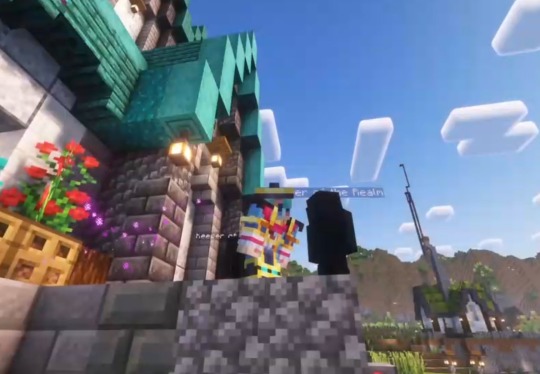
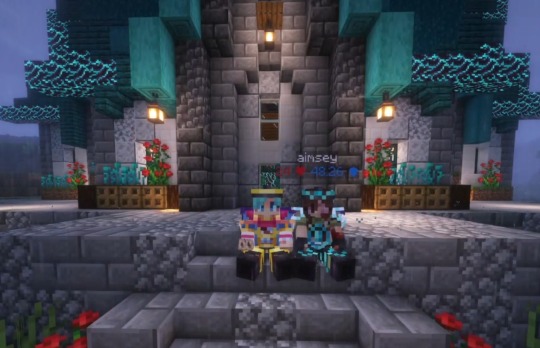
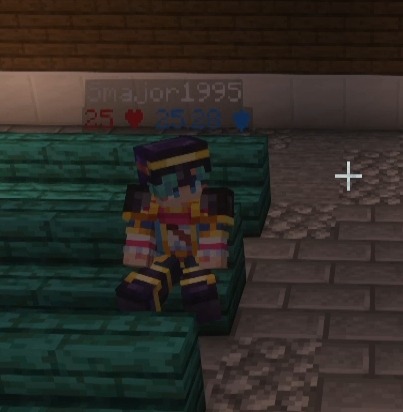
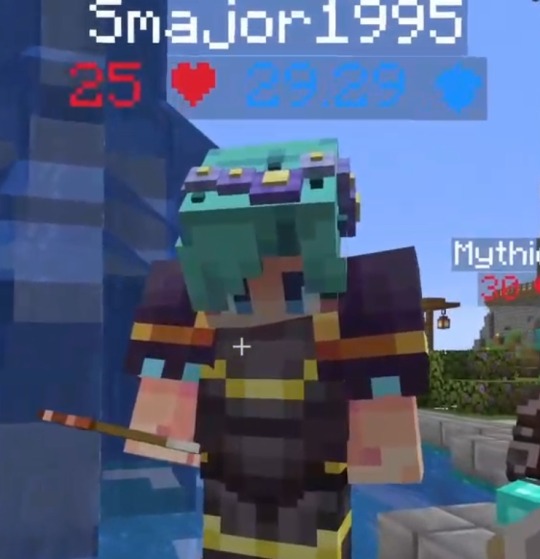
96 notes
·
View notes
Note
Super stoked for the Roger DLC and WILL be playing it on release, but something that’s been bugging me ever since the first few teasers was Peter, his personality feels quite different to me and my Peter obsessed friend, is there a reason for his personality change or was it completely unintentional?
He feels a lot more hot headed now, not completely the same as but similar to Steven, which feels like a complete 180 for Peter, I always remember enjoying him more in DSaF 2 because he was the more relaxed Phoney who when he had geniunely serious moments, it was incredibly impactful and gut wrenching when Peter would yell at me. 😔
Also, will Steven ever be real in dialtown please sir I miss my wif-
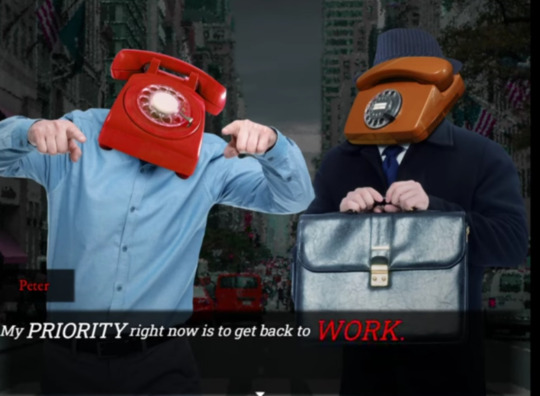
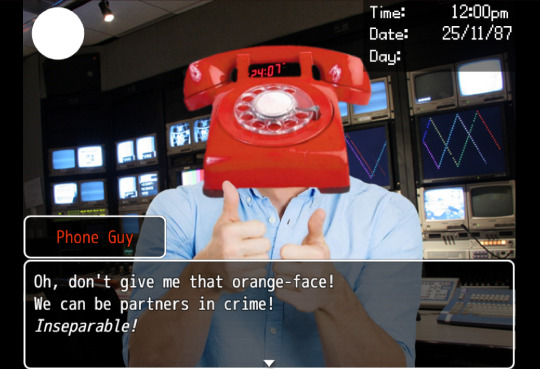
The comparison just always bothered me slightly.
Different universes. I should note that while Peter IS chiller in DSaF 2, if the restaurant goes under, the main consequence is that the company will get mortally wounded and he might die. The other employees will (for the most part) be fine. Peter cares. He cares if you hurt employees, he cares if you fuck up but is also willing to look the other way a few times if the fuckup isn't bad enough (without letting it slide, because he still cares what you do at work too.) I'd say his attitude at work namely stems from that, rather than the other way around. Steven does NOT care. He is literally willing to throw you under the bus to save himself and his sole goal is keeping the place open specifically so he can save his own hide, and his hot-headedness comes from that.
In DT, Peter is at the end of his rope and has had to deal with a LOT up until this point, arguably even more than his DSaF counterpart in terms of his day to day job, as shocking as that may sound. There's also WAY more on the line this time. He isn't the one that's going to face the worst of what'll happen if things continue at their current trajectory (unlike Peter or Steven in their original games.) He explains this pretty early into the DLC, which may explain why he's testier than you remember him, namely what's on the line. He's trying his damndest to fix it but is failing. He's stuck between a rock and a hard place with Roger, recognizing his bad leadership is sinking the plant but caring too much about the guy to effectively deal with it until this point.
His guard is up because it has to be, but he does have a few nice moments where it's clear how much he cares and if you listen to Roger's dialogue carefully, you'll see just how much Peter has put up with that would've made any sane person walk away. He's also noticeably nicer to Gingi if you don't waste his time and seem to actually care about Roger, and he acts closer to how he does in the DSaF 2 screenshot you showed off, though perhaps with slightly less energy (since he is, like I said, at the end of his rope.) There's even a scene in the evil route where you can identify this and use it against him in a pretty sinister way.
To mention another thing that even Gingi sees as far back as his original scene in DT: He's a natural manager who's playing second-fiddle to someone who clearly doesn't know what he's doing.
I didn't just wanna do more of the same, so I played with the dynamics a lil. Peter is in a very different role here, one that he's not exactly suited to. He's out of his element. He's inundated with work and in this scene, is thinking about the lives of the employees who are going to be laid-off in a week or so time if things don't change FAST, and while this is happening, his boss is bantering with a weird cryptid on the street and talking about random garbage.
There are times in DSaF 2, like you said, where you do see him get like this. It's not as much that his character is different in my eyes, but that the context is. This is a version of Peter who is one bad day away from having to make a difficult decision. Literally. I'll gladly talk more about it when the DLC's out (namely I could compare + contrast certain decisions he makes!) For now, I don't wanna spoil anything that isn't explicitly stated in the first major scene he has.
183 notes
·
View notes
Photo
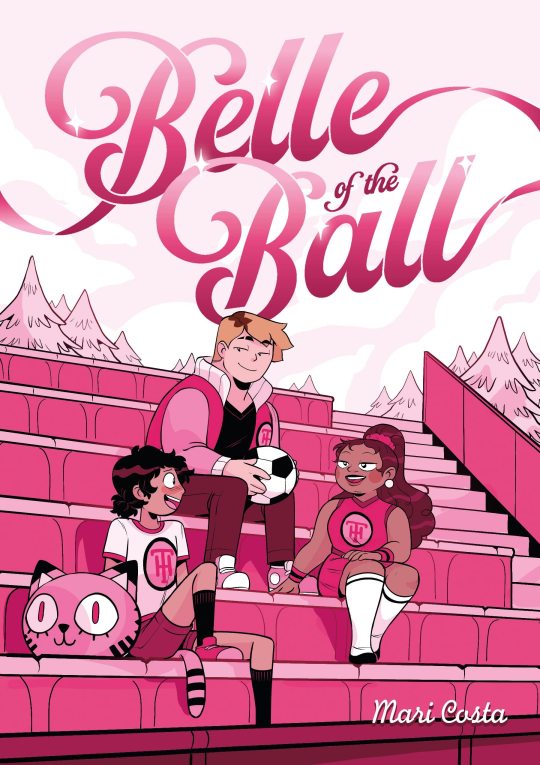
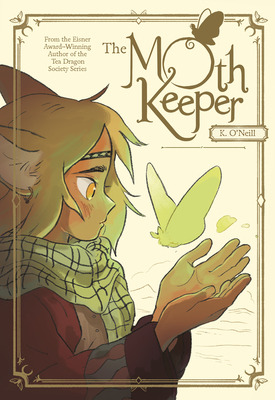
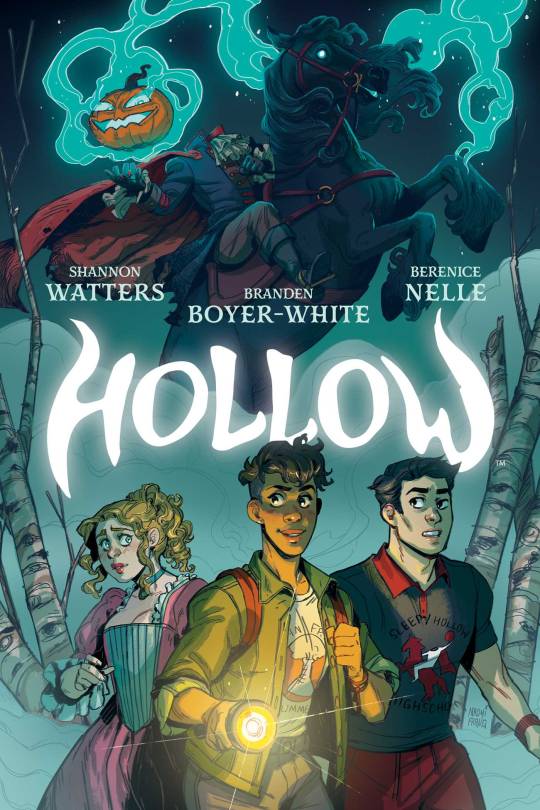
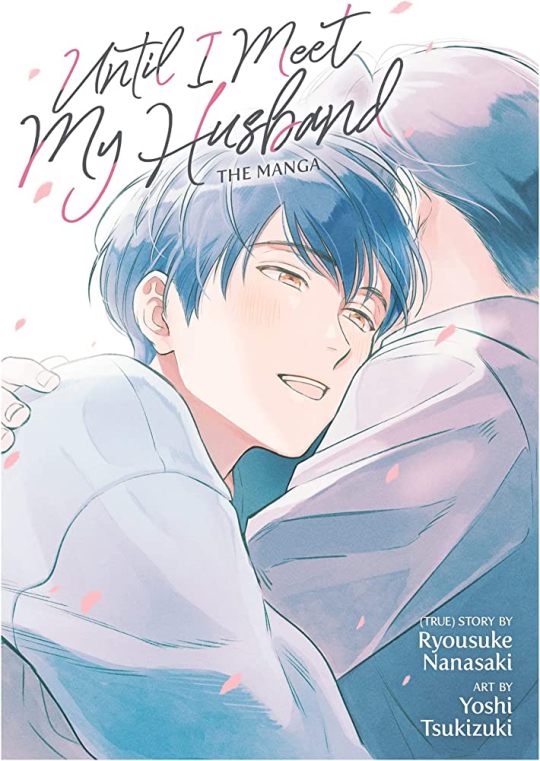
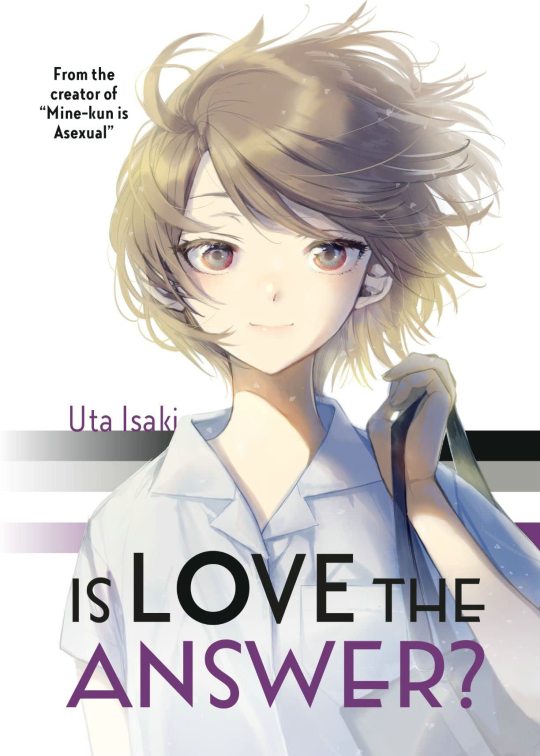
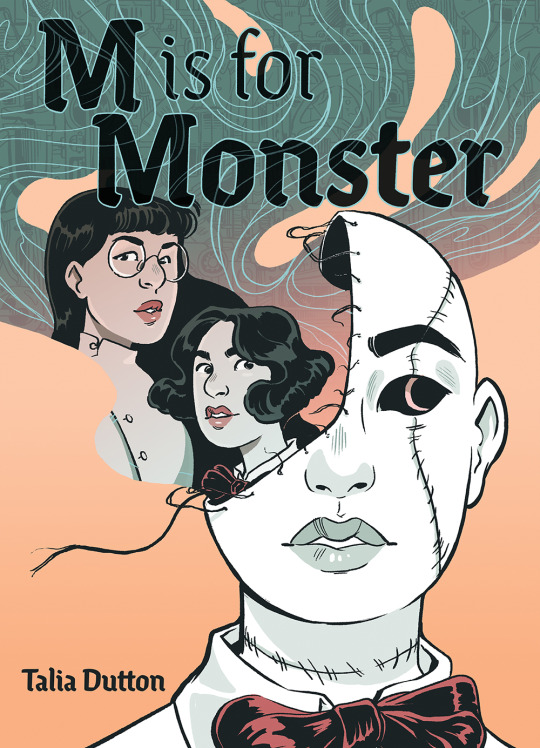
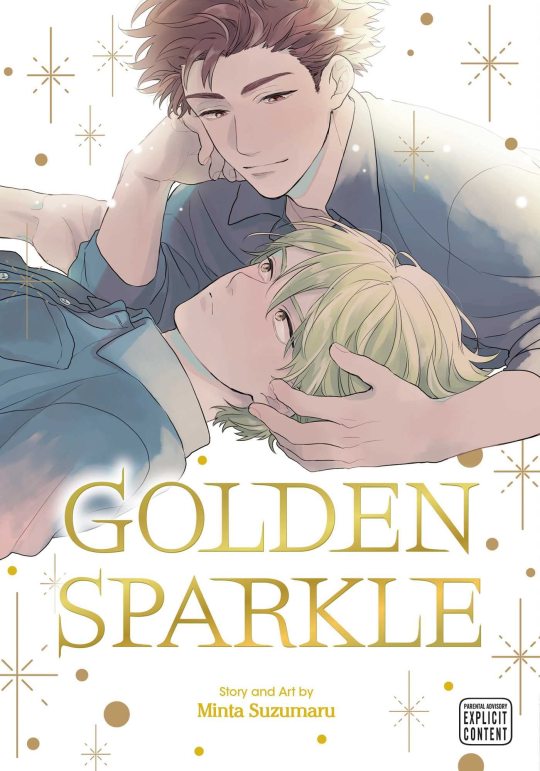
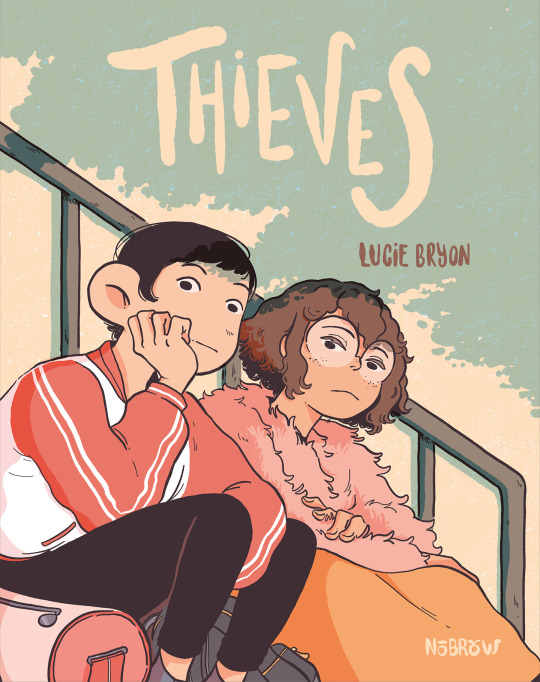
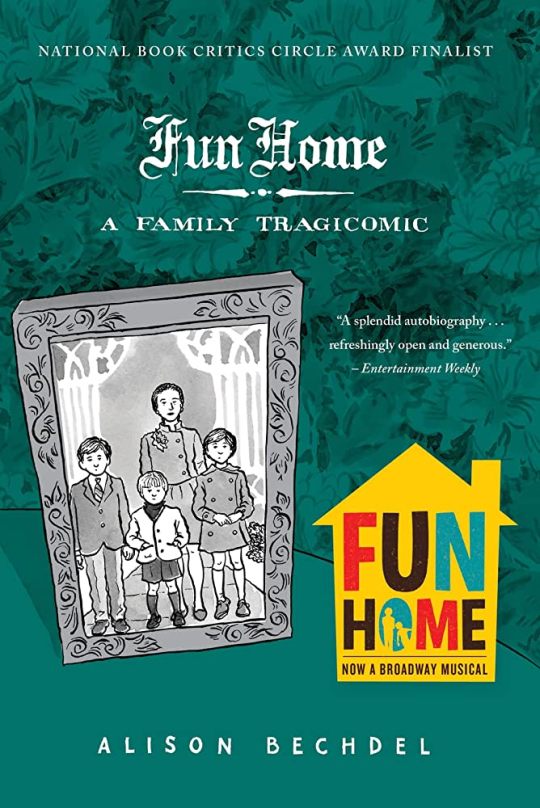

It’s Pride 2023! Time to put up some more comic recs!
This time I’ve put together some stories about discovering one’s own queer identity, outlining a family history of queerness, and several stories where being queer isn’t the focus - queer characters are simply allowed to be.
Belle of the Ball By Mari Costa
High-school senior and notorious wallflower Hawkins finally works up the courage to remove her mascot mask and ask out her longtime crush: Regina Moreno, head cheerleader, academic overachiever, and all-around popular girl. There’s only one teensy little problem: Regina is already dating Chloe Kitagawa, athletic all-star…and middling English student. Regina sees a perfectly self-serving opportunity here, and asks the smitten Hawkins to tutor Chloe free of charge, knowing Hawkins will do anything to get closer to her. And while Regina’s plan works at first, she doesn’t realize that Hawkins and Chloe knew each other as kids, when Hawkins went by Belle and wore princess dresses to school every single day. Before long, romance does start to blossom…but not between who you might expect. With Belle of the Ball, cartoonist Mariana Costa has reinvigorated satisfying, reliable tropes into your new favorite teen romantic comedy.
---
The Moth Keeper By Kay O’Neill
Anya is finally a Moth Keeper, the protector of the lunar moths that allow the Night-Lily flower to bloom once a year. Her village needs the flower to continue thriving and Anya is excited to prove her worth and show her thanks to her friends with her actions, but what happens when being a Moth Keeper isn't exactly what Anya thought it would be? The nights are cold in the desert and the lunar moths live far from the village. Anya finds herself isolated and lonely. Despite Anya's dedication, she wonders what it would be like to live in the sun. Her thoughts turn into an obsession, and when Anya takes a chance to stay up during the day to feel the sun's warmth, her village and the lunar moths are left to deal with the consequences.
---
Hollow By Shannon Watters, Branden Boyer-White & Berenice Nelle
Isabel "Izzy" Crane and her family have just relocated to Sleepy Hollow, the town made famous by—and obsessed with—Washington Irving's legend of the Headless Horseman. But city slicker-skeptic Izzy has no time for superstition as she navigates life at a new address, a new school, and, with any luck, with new friends. Ghost stories aren't real, after all.... Then Izzy is pulled into the orbit of the town's teen royalty, Vicky Van Tassel (yes, that Van Tassel) and loveable varsity-level prankster Croc Byun. Vicky's weariness with her family connection to the legend turns to terror when the trio begins to be haunted by the Horseman himself, uncovering a curse set on destroying the Van Tassel line. Now, they have only until Halloween night to break it—meaning it's a totally inconvenient time for Izzy to develop a massive crush on the enigmatic Vicky. Can Izzy's practical nature help her face the unknown—or only trip her up? As the calendar runs down to the 31st, Izzy will have to use all of her wits and work with her new friends to save Vicky and uncover the mystery of the legendary Horseman of Sleepy Hollow—before it's too late.
---
Until I Meet my Husband By Ryousuke Nanasaki & Yoshi Tsukizuki
The memoir of gay activist Ryousuke Nanasaki and the first religiously recognized same-sex marriage in Japan. From school crushes to awkward dating sites to finding a community, this collection of stories recounts the author’s “firsts” as a young gay man searching for love. Dating is never ever easy, but that goes doubly so for Ryousuke, whose journey is full of unrequited loves and many speed bumps. But perseverance and time heals all wounds, even those of the heart.
---
Is Love the Answer? By Uta Isaki
When it comes to love, high schooler Chika wonders if she might be an alien. She’s never fallen for or even had a crush on anyone, and she has no desire for physical intimacy. Her friends tell her that she just "hasn't met the one yet," but Chika has doubts... It's only when Chika enters college and meets peers like herself that she realizes there’s a word for what she feels inside--asexual--and she’s not the only one. After years of wondering if love was the answer, Chika realizes that the answer she long sought may not exist at all--and that that's perfectly normal.
---
M Is for Monster By Talia Dutton
When Doctor Frances Ai's younger sister Maura died in a tragic accident six months ago, Frances swore she would bring her back to life. However, the creature that rises from the slab is clearly not Maura. This girl, who chooses the name "M," doesn't remember anything about Maura's life and just wants to be her own person. However, Frances expects M to pursue the same path that Maura had been on—applying to college to become a scientist—and continue the plans she and Maura shared. Hoping to trigger Maura's memories, Frances surrounds M with the trappings of Maura's past, but M wants nothing to do with Frances' attempts to change her into something she's not. In order to face the future, both Frances and M need to learn to listen and let go of Maura once and for all. Talia Dutton's debut graphic novel, M Is for Monster, takes a hard look at what it means to live up to other people's expectations—as well as our own.
---
Golden Sparkle By Minta Suzumaru
Himaru Uehara’s first year of high school is off to a good start, minus one problem—he keeps having wet dreams. With only his mom and sister at home—and having skipped health class in middle school—he thinks it means there’s something wrong with him. Thankfully, a new friend has just the remedy and teaches Himaru exactly how to deal with those pesky dreams! But his solution only leads to more confusion, and the two find themselves navigating feelings they’ve never felt before.
---
Thieves By Lucie Bryon
Ella can’t seem to remember a single thing from the party the night before at a mysterious stranger’s mansion, and she sure as heck doesn’t know why she’s woken up in her bed surrounded by a magpie’s nest of objects that aren’t her own. And she can’t stop thinking about her huge crush on Madeleine, who she definitely can’t tell about her sudden penchant for kleptomania… But does Maddy have secrets of her own? Can they piece together that night between them and fix the mess of their chaotic personal lives in time to form a normal, teenage relationship? That would be nice.
---
Fun Home: A Family Tragicomic By Alison Bechdel
Meet Alison's father, a historic preservation expert and obsessive restorer of the family's Victorian home, a third-generation funeral home director, a high school English teacher, an icily distant parent, and a closeted homosexual who, as it turns out, is involved with his male students and a family babysitter. Through narrative that is alternately heartbreaking and fiercely funny, we are drawn into a daughter's complex yearning for her father. And yet, apart from assigned stints dusting caskets at the family-owned "fun home," as Alison and her brothers call it, the relationship achieves its most intimate expression through the shared code of books. When Alison comes out as homosexual herself in late adolescense, the denouement is swift, graphic -- and redemptive.
---
She Loves to Cook, and She Loves to Eat By Sakaomi Yuzaki
Cooking is how Nomoto de-stresses, but one day, she finds herself making way more than she can eat by herself. And so, she invites her neighbor Kasuga, who also lives alone. What will come out of this impromptu dinner invitation...?
Kasuga and Nomoto promised to spend their Christmas and New Year’s together. Now, they find themselves learning more about each other’s families through the food sent by Nomoto’s mother. Cute character bento, salmon and rice, stollen, fruit sandwiches, roast beef…Nomoto and Kasuga warm up to each other over a cheerful holiday season.
#Pride 2023#book rec#comic#graphic novel#autobio#fantasy#science fiction#high school#queer#lesbian#gay#asexual#intersex#bisexual#romance#book recs#pride#LGBTQIA#LGBT comic
1K notes
·
View notes
Text
GX Character Names - an in-depth analysis
(i promise there's more substance than you think)
⇀ yūki jūdai (遊城 十代)
« yū (遊) - play, enjoyment » « ki (城) - castle »
The yū (遊) uses the same kanji that all the other Yu-tagonists have, but it's probably more relevant to Judai than any other protagonist. 遊 is a particle with many associations, most notably play and games, but also enjoyment, freedom, travel, and hedonism. All the protagonists play children's card games, but Judai is the one who most treats it like a children's card game, even when he shouldn't. His signature phrase is literally "That was a fun duel!"
The ki (城) kanji means castle and could be a slight nod to his past life, but more importantly, yūki is a homophone of 勇気, meaning courage and fighting spirit -- fitting for his hero theming and pure shonen protag energy.
« jū (十) - ten » « dai (代) - generation »
First of all, there's a fun connection with the first character of Judai's name meaning 10, to the first character of Manjoume's name being 10,000, as well as the Tenjoin siblings phonetically having 'ten' in their name (Fubuki even references it by signing his name '10join').
The second character dai (代) is fitting given the name of the show. The G in GX stands for "Generation." And the X stands for "neXt," but get this -- X is also 10 in roman numerals.
That's right... Judai's name is literally GX.
It goes deeper though. The more blatant meaning is that taken together, 十代 means adolescence, or teenager (it has similar etymology to the latter, something like "the tens ages"). But jūdai is also a homophone of 重大 - serious, grave, of great importance. That's it, those are literally the themes of the show in one name.
GX is ultimately a coming of age story. Judai is a kid who just wants to play games and have fun, but over the course of the show, is forced to give up that childish simplicity in the face of adult responsibility. He starts off believing that being a hero is just about courage and shonen ideals, and learns though grave consequences that it's not, and that being a hero isn't fun at all.
⇀ manjoume jun (万丈目 準)
« man (万) - ten-thousand » « jou (丈) - height, strong » « me (目) - eye, seeing »
This is where the 1, 10, 100, 1000 chant comes from. Combined with the second character, it feels grandiose and ego-inflated, then when you add on the final character, me (目), associated with seeing, the vibe you get is something like "looking down on (from a height of 10,000)." All of which makes his insistence on being called Manjoume-san even more conceited, but also gives you an idea of how the Manjoume family name looms over Manjoume himself.
« jun (準) - semi, secondary »
In contrast to his family name, his given name shows us the other side of Manjoume's character. jun has several kanji spellings with positive and auspicious meanings. One of them, 潤 (to profit, to become wealthy), would have been an obvious choice for our rich boy.
But no, instead they chose 準, a kanji with a meaning that can be difficult to pin down. It's associated with preparation and reserves, such as reserve funds (準備金) -- in other words, being the back-up, extraneous. In the workforce, it indicates assistants, associates, juniors (準会員, 準社員). It's part of the words for semi-finals (準決勝) and runner-up (準優勝). Ultimately, it's a character that carries a meaning of being secondary.
Underneath all that snobby pomp, Manjoume feels inferior to his brothers, and can also never win against Judai, and this drives his character arc. The tension between his last and first names, of "looking down on" and "being secondary," is emblematic of Manjoume's internal conflict.
This is driven in even further by the fact that his brothers have first names that complement their last name. The first character of his oldest brother's name, Chosaku (長作), means leader, senior, or superiority (which directly parallels the meaning of associate for Jun, and also fits with Chosaku being a businessman), but it's also phonetically the same as 兆 which means one trillion, basically exaggerating upon the 10,000 of his last name.
Meanwhile his middle brother Shoji's name (正司) starts with the character associated with truth and lawfulness (ironic considering he's a slimy politician), was archaically used to mean of higher rank in court (again paralleling Jun), and also has a niche meaning of 10 to the 40th power, or... 10,000 trillion trillion.
⇀ marufuji shou (丸藤 翔) and marufuji ryou (丸藤 亮)
« maru (丸) - circle, entirety, perfection » « fuji (藤) - wisteria »
Circles are significant symbols in Japanese culture, used in divination to represent completeness and perfection, and the kanji 丸 also carries this meaning. Wisteria is a cultural symbol too, representing love and longetivity, with a tie to royalty and nobility.
All together, the name rings as elegant and dignified. In season 1, we see how Shou feels pressured and unable to live up to the name he shares with his brother, who embodies it. Perfection is a key part of Ryou's character -- in the graduation duel, he even acknowledges that he has reached perfection, but also that it is a limit, setting up for the deconstruction of the theme.
« shou (翔) - to soar »
Shou's name simply represents his character arc, starting from Osiris Red with no confidence in himself, and ending in Obelisk Blue, surpassing his brother who has an opposite arc of "falling." It's also a homophone of 小 meaning small or younger.
« ryou (亮) - clear, brightness »
The kanji used for Ryou's name is part of words like moonlight (亮月), rightfulness (亮直), as well as words associated with royalty, like mourning the emperor (亮闇). All of which vaguely match the tone of Ryou's character as "the Kaiser." The Cyber Dragons are also light attribute, and he is introduced with "light" theming which is all reversed after his turn to the dark side in season 2.
The kanji can also be part of the word ryousatsu (亮察) which can mean to take into account, to consider, and to sympathize. A core theme of Ryou's character is having respect for his opponent and not underestimating them -- this is why you'll often hear Shou referring to "respectful dueling," and also why Power Bond is their signature card, because without respecting your opponent's capabilities and taking their field into account, the card will backfire on you.
Oh, and as an aside, Ryou does not use the same kanji as Bakura Ryou from the original Yu-Gi-Oh, who uses 了 -- completion or ending.
⇀ tenjoin asuka (天上院 明日香) and tenjoin fubuki (天上院 吹雪)
« tenjo (天上) - heavens » « in (院) - institution »
The first part ties into the Cyber Angels that Asuka uses, as well as the Atmosphere cards that Fubuki uses in the manga. It's also referenced by Fubuki in his embarrassing pickup line ("What do you see above?" "Ten... join!" This is the guy that Manjoume thinks is the love magician)
The second part is a particle used for institutions, particularly stately ones in government or higher education, which makes sense if you believe Asuka becomes a teacher. Overall, it's a refined name which perfectly suits Asuka, and not Fubuki.
« asu (明日) - tomorrow » « ka (香) - fragrance »
The first part of her name is why Jim calls her Tomorrow Girl, which spawned the Asuka/Jim ship by itself, but it also suits Asuka really well, because her character arc in season 4 is ultimately about moving on and embracing the future. She leaves behind the safety of Duel Academy and takes a step into the unknown by going to America.
« fubuki (吹雪) - blizzard »
This is why he's nicknamed the Blizzard Prince. Otherwise, he doesn't have any connection to blizzards, but Asuka uses ice decks in the Society of Light and in the manga, so the Tenjoins both have some ice theming.
⇀ misawa daichi (三沢 大地)
« mi (三) - three » « sawa (沢) - marsh, brilliance »
Another number-themed name alongside Judai's 10 and Manjoume's 10,000. sawa is a common kanji in names, but you could argue it ties into his signature monster, Water Dragon.
« dai (大) - great, vast » « chi (地) - earth »
Of his six decks, we see two of them, his water deck and his earth deck. The latter of which he uses against Tania, who in turn uses her wisdom deck -- which is perfect because daichi can also be a homophone of 大知, which means great wisdom. Nerd.
⇀ tyranno kenzan (ティラノ 剣山)
« tyranno (ティラノ) »
This name is derived from tyrannosaurus rex. Because he's got dino fucking DNA.
« ken (剣) - sword » « zan (山) - mountain »
The literal characters are fitting for Kenzan, who has an offense-focused deck of mostly earth attribute monsters, and a personality to match. But as a whole, 剣山 refers to a tool in traditional flower arrangement. The kenzan is the base in which the arrangement is stuck into, a foundation which keeps the structure secure. Kenzan ultimately looks up to Judai (and calls him aniki) because he wants to be a leader like him, one who can bear the weight of his followers' expectations. We don't get much of this after his introductory episode, but I still think it's a fitting name for a dependable guy.
⇀ saotome rei (早乙女 レイ)
« sa (早) - early, quickly » « otome (乙女) - maiden »
This one is pretty on the nose. The first character refers to how she came to Duel Academy early, being younger than all the other characters, and not joining the cast until much later. The otome is the same used in her signature card Koisuru Otome, or Maiden in Love, and also refers to a romance genre for girls. As a whole, saotome is also a term for a girl who plants rice paddies.
The name may also be a reference to Saotome Ranma, the protagonist of Ranma ½, which is about a boy who changes into a girl when splashed with water.
« rei (レイ) »
Rei is a unisex name with many different kanji spellings and meanings, but instead, Rei's name is spelled with katakana. Given that she dresses as a boy twice and uses masculine pronouns in Japanese, this may be to make the gender more ambiguous than if kanji with more gendered connotations were used, such as 麗 (graceful) or 鈴 (bell sound) which are more feminine, or 零 (zero), or 令 (authority) which are more masculine.
If you ever wondered, Ray from Arc-V also uses the same katakana spelling, though this may be because most of the Arc-V characters from other dimensions use katakana, which sounds more foreign or ambiguous in origin. Meanwhile, Rei from Zexal uses 零 (zero).
---
Feel free to correct me if anything doesn't seem right! I'm not Japanese and may have read too much into some of this.
#gonna start putting out more content that isn't art#the gx thoughts have been contained for too long#judai yuki#jun manjoume#shou marufuji#ryo marufuji#asuka tenjoin#fubuki tenjoin#daichi misawa#tyranno kenzan#rei saotome#yugioh gx#ygo#ygo gx#pico commentary
189 notes
·
View notes
Note
I read your Azula redemption post, and I like it. It's kind of sad, but hopeful at the same time. I saw you said you had other ideas for Azula redemptions. Can you give us another? Is there a version you see where she and Zuko are still in each other's lives? One where she maybe still has some power, like as a general or advisor or something?
Thank you! Yeah, it was kind of bittersweet. I think it's also the most complete version of a redemption for Azula that I could think of working for her. The thing about her staying in court with any sort of power is that, to me, it feels kind of like letting a drunk run a bar. The reason I see Azula needing to either be in prison or in exile is because within certain circles, Azula would have a lot of people wanting to put her on the throne in Zuko's place. I think it would take a long time for her to not want to be on the throne in Zuko's place, and well, there goes the whole redemption narrative for her.
As for her having a relationship with Zuko, the version I put in that outline is probably the healthiest one they could have. In a redemption arc where she actually wants a close relationship with Zuko, I don't see her wanting to share him with anyone. At best, she would tolerate his friends and family. Mostly, I think she would resent the fact that he was all she had, but she wasn't all he had. I don't see her being the cool Aunt Azula to his children. She might form a bond with the child that is most like her, if she's allowed the time to spend with them, which I don't see being the case. Obviously, in any of my stories, the mother of Zuko's children is Katara, and I don't see Katara being okay with Azula being around her kids. Especially, unsupervised (completely understandable, btw). I mostly think she wouldn't want to interact with Zuko's kids at all. Her resentment for Zuko having people who love and support him apart from her would color their relationship and cause a lot of tension between them.
The one version of an Azula redemption where I could see her and Zuko having a "normal" relationship where she is actively a part of his life and knows and is known by the people most important to him is an AU story where she never tried to kill him.
The problem I have with most Azula redemption stories is that they don't tend to address the very real harm she did. They just kind of blow past the fact that she was a villain and excuse everything she did because of Ozai's abuse. First of all, canonically, the most abuse we see her get is being Ozai's Golden Child, which yes, I do believe is a form of abuse, but isn't enough to let her off the hook, which a lot of Azula redemption stories do. Second, blaming all of her actions on her abuse completely ignores any agency Azula had, which I think is insulting to her character. Azula was cunning, astute, and ruthless. Let her be those things. She hurt Zuko and made enemies of his friends. Let her have to face the consequences of that, too. An Azula redemption would be messy and inconsistent, and that is not only okay, it's necessary.
#atla#azula#azula redemption#it would be messy#it would also be a fantastic story#zutara#just a lil' bit tho#not that much
63 notes
·
View notes
Text
People need to realize that there is a difference between liking a character as a character and liking a character as a person.
I like Azula as character. Does that mean that I like and support whatever she does? No. Azula is an antagonist in ATLA and is the face of manipulation herself. She's violent, cruel and would eliminate everyone who gets on her way. Almost everything she does goes against every moral stands I have. I don't like what she does because she is a horrible person.
BUT..
I like her as a character. I like how she is written. I like how she was portrayed as a villain. She is portrayed as this perfect, precise and smart villain but what I loved the most is how the writers still managed to show that no matter how intelligent and powerful she is, she is still a human. She has a human weakness that became the very catalyst of her sanity that lead to her downfall.


I like her as a character BUT I don't like her as a person. Azula is a good/well-written character but she is a horrible person.
There is a difference between a likeable character and a well-written character. A character's likeability doesn't define how well or bad they are written. A character could be be horrible as a person but still well-written and a likeable character can be poorly written.
An example of this is how M𝚊rinette Dupain-Cheng's character from the earlier seasons (particularly Season 1-3) of Miraculous: Tales of Ladybug and Cat Noir was handled. She's one of the good guys alright. She saves people with her alter ego, she stands up against bullies, and she genuinely cares for her friends. How did I say she was poorly written you ask?
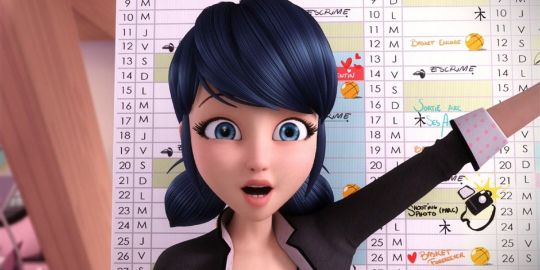
Image 1 Context: M𝚊rinette has Adrien's personal daily schedule for the next three years
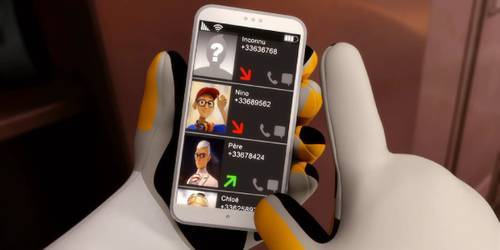
Image 2 Context: M𝚊rinette stole Adrien's phone to delete an embarrassing voicemail.
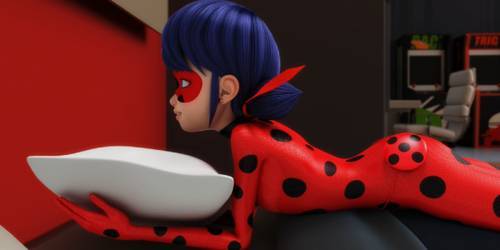
Image 3 Context: M𝚊rinette snuck into Adrien's bedroom as Ladybug to give him her gift.
Flaws are what makes good characters interesting and relatable. They can make mistakes and be selfish at times because they are supposed to be human. I mean human in a sense of being imperfect.
But these flaws and mistakes are supposed to be addressed. No part in any of the episodes these scenes addresses M𝚊rinette's actions and views them as mistakes and flaws. If anything, she's being rewarded with her horrible actions instead of suffering from consequences just like how she was never busted from sneaking into Adrien's bedroom and instead got her gift cherished by him.
That being said, these criticisms of her character are only based on how she was written in seasons 1-3. I am no longer watching this show and I don't know how her character is being handled in the later seasons.
What I am trying to point out with the Marienette example is that likeable/good characters can be poorly written.
Also, the amount of a characters' suffering and their good/bad actions doesn't define how well they are written. How well a character is written depends on how thay are handled, the execution of the concepts tied with the character and how their simplicity or complexity is handled.
The same way happy endings doesn't automatically mean well-written endings and how sad endings doesn't automatically mean bad endings.
PS: You don't have to support everything a character does all the time just because they're your favourite
#anti marinette#marinette critical#mlb critical#atla azula#azula#atla#criticisms#critic#characters#miraculous ladybug#favourite characters#atla meta#not because I like a character it means i support their shi
59 notes
·
View notes
Note
I'd like your thoughts on the segment of TOH fandom that attributes Luz' behavior to her having been bullied and ostracized in Gravesfield. Canonically there is nothing showing Luz being bullied or says that she was bullied in Gravesfield. Quite the contrary. Yesterday's Lie had Vee, who had been living as Luz for months, living a good life where she had made friends at camp and at school. She resented Luz' return and castigated her for not appreciating how good a life she had. The episode Thanks to Them had the guidance counselor ask Camila if she had been bullied in school to which Camila answered that she had. He then asked if she wanted Luz to struggle as she had. That question strongly suggests that Luz was not yet having any social difficulties beyond those of her own making and that sending her to camp would keep that from happening. When we see Luz back in Gravesfield HS she was having no difficulties dealing with other students and that some of her contacts with them were friendly and admiring.
So what are your thoughts on this insistence of certain fans that Luz had suffered this bullying and ostracization when the show itself not only doesn't support it but contradicts it?
Because it's necessary for Luz's character to function.
That's really all it comes down to. Luz is kind of monstrous if she has never actually known strife. She wants to be seen as the victim after all. She wants to be justified in abandoning her mom for her fantasies. For rejecting the consequences of assaulting people. Heck, that's still true in S3 where she needs to be able to claim that the human world would be some torturous hell hole for her so that her self martyring actually comes across correctly instead of someone going, "Oh, that sounds like a lot of work and might actually be dangerous so I'm just gonna stay home with my loving mom instead."
If her home life was good, was kind, was what we wish our home lives with a parent who will enable us to do whatever we want short of breaking the law... What the fuck is she doing? The audience insert, who goes entirely unquestioned in the show besides "Hey, you kind of messed up, go apologize," (which she doesn't do well all the time) is suddenly this whiny brat who wants to be enabled by literally every person in existence because she needs to be the most special person there. It's the antithesis of what people want "I just want to be understood!" to be about. She wants to be understood so you go "Oh, I get it, you keep being you," and never hold her accountable. Otherwise, she might not lie all the time because she might be willing to actually face the consequences of her actions.
It is a shift in Luz's character irreversible in its damage. You just cannot like the show in the same way when you have to admit that Luz is a self entitled little shit. And mind you, her normal archtype is of that sort. Danny Phantom and Randy Cunningham and even to some extent Kim Possible are all flawed teenage characters who are clearly growing. Who need to be better people so while they're protagonists, you're supposed to learn as much alongside them as from their example, if not more. You are meant to take from Luz by example though. She is meant to be the audience surrogate after all. And, you know, if she's unjustified in her actions... What does that say about you all of a sudden who connected so deeply with her?
That's all of why this can't vanish. I actually want to add onto your proofs though because people will go "What about her panicking during Knock Knock Knocking?" Yes, that is the ONE time we are ever given the idea for her being mocked for something and even that one... Well, she's worried about going too over the top. How much do we want to bet Luz came to school in her suit to ask the person she liked out like she was in some sort of soap opera? That's gonna get you reasonably laughed without a VERY specific sort of partner like Amity.
HOWEVER... That's the one time, a season and a half into the show, her actions imply someone who has been bullied. Otherwise, she is very confrontational, she does nothing to hide herself, she gives almost no shits about what anyone thinks about her besides "Fuck you, I am totally the greatest" everytime Eda doubts her. The closest before then is her worrying about Amity seeing her as lame but Amity is the only one she cares about for that. Even then, she never seems bothered by the fact that Amity is a bully. She is willing to stand up to her regardless. This is further reinforced by what she does with Boscha where she either just brushes her off during Once Upon a Swap or is entirely confident in confronting her in Winging it Like Witches. NONE of that is the behavior of someone who has been bullied, harassed and hurt by constant bullying. Add all the elements where she clearly could have found people like her but chose instead to chase more popular clubs like cheerleading and acting and it paints a REALLY bad picture of Luz.
It paints her as Liz Lemon from 30 Rock, or Goob from Meet the Robinsons. Both people who claimed the world hated them when the reality was that they were awful to reality, one being a bully and the other ignoring all signs of kindness and acceptance that was attempted to be given to him. This is far worse when you remember that Luz never appreciated her mom properly, like Goob, and also is genuinely an asshole to both King and Hooty for their interests, like Liz Lemon.
Luz is a bad person. But for the show to function, you cannot believe that. Once you do, it will only to start to collapse faster and faster as the contradictions pile on top of themselves.
So why not just twist the truth instead into the pleasant lie Luz is actually the archtype of the bullied nerd that the first episode tried to imply she was but then failed to ever deliver on? It's easier that way, even if it's dishonest. Luz wouldn't judge you for it, not so long as you didn't try to lie to her. Because all that matters in the end to Luz is Luz.
======+++++======
If the idea of a fact that's not well supported by the show being critical to a character functioning sounds familiar, it's because it's the same reason why people need Odalia to be pure evil. Both Amity and Luz need to use having been hurt by others to justify their own behaviors, even when their behaviors don't correlate in ways that actually support those excuses.
I have a public Discord for any and all who want to join!
I also have an Amazon page for all of my original works in various forms of character focused romances from cute, teenage romance to erotica series of my past. I have an Ao3 for my fanfiction projects as well if that catches your fancy instead. If you want to hang out with me, I stream from time to time and love to chat with chat.
A Twitter you can follow too
And a Kofi if you like what I do and want to help out with the fact that disability doesn’t pay much.
45 notes
·
View notes
Text
I'm gonna just nip this in the bud. I will say some people are going to find others within this space heartless or believe that they just despise certain characters. Or that they just favor another character so much that they don't care about any other one or anything else that may happen.
I'm pretty sure given my responses today people are going to think that about me too. It won't be the first time they will either. At times it goes beyond that though.
Personally I hate when people are annoying know-it-alls who parade around going,
"Well how do you feel about the choices you made now, huh?"
As if everyone else has egg on their face but them. Also for those actually curious about the answer to that question and wondering how to respond to talking points like that.
I tend to really reflect on my choices and examine whether I'm personally satisfied with them or not then adjust accordingly moving forward. I'm the sort that dwells on things often in real life. So when it comes to media especially interactive media I tend to take every decision seriously.
It's easier to not engage with people acting in bad faith and only making statements in order to shame and ridicule others. However, I feel what's more important than the person asking the loaded question are the feelings of the individuals being asked. It's important to distinguish if one is regretting something genuinely or being made to regret it through the impact of others.
Because if it's the latter removing oneself from the setting where those people are for a bit of time may be best.
I used to have this issue with people being extremely critical of my life choices and how I discussed as well as engaged with my interests. Sadly, I had to cut a lot of people out of my life in order to live it fully. I also needed to be more firm with myself and figure out when to tell myself no and stick to that no.
Yet, when it comes to making decisions with media I've always been of the same mind on it. So when people do ask questions like this about things that I enjoy, pressure me into choosing options in games that'd I'd rather not because they've attached some sort of moral judgment to play styles, or simply want to gatekeep I can still choose the route most comfortable for me and what I want to experience.
I want to be able to say,
"Well, since you're asking I'm still as pleased with my choices as when I made them. I don't make decisions solely based upon how much I fear the consequences of not making them or making them. I tend to seek out a resolution that will allow me to avoid creating more regrets for myself or betraying my own feelings and/or beliefs. Never because a character or person in real life threatens me with any sort of consequences. I don't enjoy being strong-armed or pushed into making a judgment. I care about others but when it comes to the way I live my life and what I'm willing to allow or not the one person that should be listened to the most there is me. Hope this helps."
Or,
"It's regrettable and maybe if I knew that this would be the outcome my choices would have changed."
Depending on how little or how much I know about the media. In the case of Milgram I'm happy to say my feelings are the former instead of the latter. I'm happy that Milgram regardless of how many fans don't take it seriously has a staff that does. Especially the writer who is willing to take Milgram to the places that the audience's choices leads it to.
Certainly this doesn't change that it is undeniably tragic that so many people lost their beloved characters today. Possibly due to the actions of someone else's favorite character or another favorite of their own. That can cause a great deal of hurt and upset. That's something which should be considered and respected by everyone.
However, being a whiny little know-it-all or a little "I told you so" is going to get people the same energy they choose to put in today. Especially given this environment gets so pissy when people's theories are proven correct. Then pitch a fit because it didn't align with their interpretation. Going off claiming things like the writer just wrote it wrong or just writing straight libel about the staff in general.
So many people are tired of some individuals trying to make other people in fandom feel like fools for liking or disliking a character. For voicing their opinion on a piece of media. For voting on the series driven by audience engagement.
If anyone has a problem with the rules of Milgram they can just not play. Hate the game not the player.
From the beginning the series told its audience,
"Losers please exit left."
There's no amount of I told you so that is going to magically change what Milgram is. It's more likely to upset and discourage people who enjoy the series from showing interest in it publicly which is a disservice to everyone.
Shaming people for voting a certain way needs to stop. The pick me voting trends need to stop. Oh well I'm a inno voter so, well I was a guilty voter so.
Literally absolutely no one cares.
People can't even bother to vote in real life elections there are many people who don't vote in Milgram as well. Many of those individuals could easily say well it's not on me I never voted and every party would still be looking pretty ridiculous by the end of that debacle.
I get that people may be upset about their favorite characters dying but behaving like this is just a bit embarrassing. Especially since any of the people innocent could have intervened with Haruka and the one person to attempt to is the guy the fandom is always harping about not being like.
At a point it just comes off as willfully missing the point and intent behind the work.
This is the very last trial we're going to get to vote on at all.
Please, let's try to make it a fun one instead of a shame filled tit-for-tat experience. Because a good deal of the characters still standing now were innocent trial two, one, or both of them. The actions of trial one aren't just negated by these characters second verdicts.
The result we've reached right now is a culmination of many choices. The good and the bad. If Mu was voted guilty from the start or Haruka was they more than likely may not have had a relationship at all. If Amane was voted innocent round one she may not have fallen back on her beliefs as hard as she did trial two.
Jackalope even said in the very first voice drama,
Es Voice Drama 8:56s
"If you don't push her, you'll just end up believing the assumptions that she's pure, innocent, and kindhearted."
Once we go into causation no one's hands here are clean.
Beyond that, there's no telling what could happen from this last verdict or after it. What the result of that final verdict will be is anyone's guess. Shidou said there was a death at the end of Milgram in his first trial interrogation,
Shidou Molech 5:55
"Hm... But this place does reek of death. I'm sure that some sort of death will lie at the end of Milgram."
Yet there have already been three deaths at the beginning of the end.
The prisoners are stated not to be able to attack each other during the trials barring one completely unregulated exception. So there may not be any more attacks up to the end. We don't know if there's another intermission after this either.
Or even how the verdicts have impacted the prisoners still alive on top of their responses to the deaths. Hell; we don't even know how this occurred yet. It feels a bit like jumping the gun to blame it on the verdicts of one trial or one prisoner especially when Yamamaka stated during trial two the progression of Milgram is not decided solely on how the characters respond to their verdicts individually but how these verdicts overlap and impact everyone within Milgram.
Q.05 So far, what has been the most challenging? Yamanaka:
Yamanaka Because I have to change the script in accordance with the audience's decisions, I can't create the entire story in advance. Furthermore, as of the second trial, there aren't only individual character storylines, the prisoner's verdicts begin to emerge and they influence each other. That is to say, I can't start writing until after everyone's results are out. Willingly subjecting myself to doing something this unreasonable, is what I feel is difficult for me. But because DECO*27 is also going through the same hell, we're holding on to some semblance of sanity.
So, blaming it on just one thing is a bit reductive in my opinion. Every part of the staff have worked their best to create a story where the characters don't feel two-dimensional who instead come off like anyone one someone could come across in their everyday life.
The ways the verdicts impact all of them reflect that. That's the goal and I think it's a respectable one to strive for.

Gotta preface this with it may be inaccurate because google translate but still ,
流れてくるシナリオ・キャラクター系の創作論とか本当見てられない。物語をスムーズに回すために産まれたキャラクターなんて型にハマったものを作るくらいなら、物語が止まっちまうくらいめんどくせぇキャラクターを創って、どうしようもなく血反吐吐いて地獄の底でピースでええわい。 I really can't stand to look at the creative theories on scenarios and characters that are floating around. Rather than making a character that fits into a mold and is created to make the story go smoothly, I'd rather create a character that's so annoying that it stops the story, vomit blood and die in the depths of hell.
Also this isn't specific to Milgram theories or anything this is just a general statement. He also said this in the Hallucination interview,
Q.04 So far, what's made you the happiest? Yamanaka: Everything. As a creator it brings me great joy to see a work that existed in my mind, take shape and be enjoyed by so many people. Other than that, because I also love the characters I've birthed, seeing all the guards talking about them and sharing their thoughts, both positive and negative, has to be the best feeling.
Ultimately I believe it's good to have things that are sometimes more complicated than we believe they can be. What's not good is blaming and shaming others for things not going exactly the way one may have personally wanted them to.
Please, just stop this. It is not a flex, no one is impressed, it's just meanspirited. Doing this is a waste of the time and energy of everyone who is involved whether they are doing it, coming across it, or being made victim to it.
It's a cesspit that only ruins any enjoyment all of us could have literally doing anything else. Everyone has been begging for an update and now that there's a full fucking preshow before the last trial some people only have complaints.
It really makes no sense.
It feels like most people in this space were waiting for an update to find something to vindicate their upset or give them the greenlight to go ahead and harass others again for how they engage with the work.
Come on now that can't be anything other than gross.
If that was the desire of people doing anything like this then they are unquestionably worse bullies than any of the characters in Milgram who need to take some time to reflect on themselves.
Because at a point change can only start with ourselves.
34 notes
·
View notes
Text
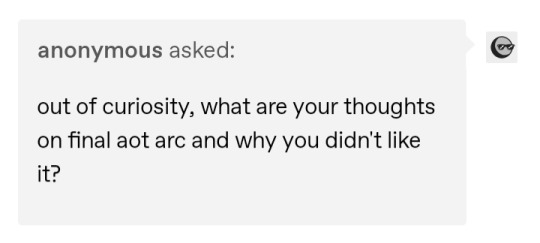
Thank you for killing me slowly by a thousand mental cuts the ask, anon! First of all, lemme apologize for taking so long to answer, but in my defence, you asked me quite the question here.
I want to say first that I used to be a big snk fan. And then the final chapter was released. It was so bad that it made me look at the whole series with a very critical eye, which made me realize that snk has never been that great to begin with. What really made this story good was the anime produced by WIT, and what really carried the story was its big mystery box. The moment we opened it, everything went downhill bc this was no longer a fantasy world, but a lazy parody of ww2 Germany & Japan.
But more importantly, and referring to the final arc, I started to notice all the rot hidden in plain sight: its fascist and antisemitic undertones, the awful writing, the lackluster worldbuilding, the braindead politics and the inconsistent treatment of characters.
Despite my newfound interest for the cautionary symbolism of Reiner and his character arc, I still think it was handled poorly. I have the same problem with characters like Gabi, Annie, Magath, and Pieck. Their individual arcs ended with them facing no real consequences for their crimes. Magath, despite being a literal representation of the nazi, was rewarded by the plot with a heroic death (a baffling choice when you think about who he is and what he did, and just how brutal and meaningless all of the Scouts deaths were pre timeskip). Reiner, Annie, Pieck, and Gabi were all rewarded with the promise of a new, happier life ahead of them, despite being responsible for hundreds of thousands of deaths directly or indirectly.
Gabi herself is proof of just how bad the writing is: RBA lived inside the walls for around 3 years, and yet they still went on with their mission. They still killed Marco. Annie still massacred those Scouts. It took Reiner 7 years to fully acknowledge that what he did was wrong and to finally make amends ... by joining an alliance that had the same goal as that of the warriors for the whole goddamn arc: take down Eren. However, Gabi realized she was wrong in like what, just a few months at best? Their development is dictated by however the plot needs them to be or act. But there's more:
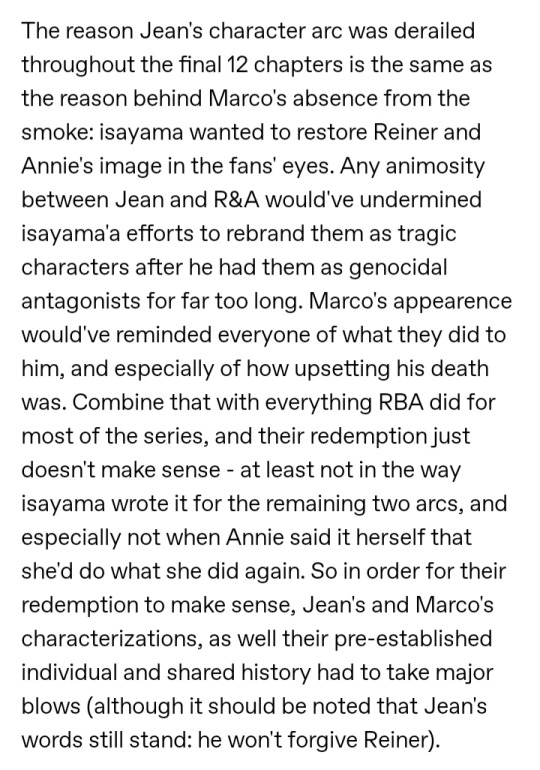
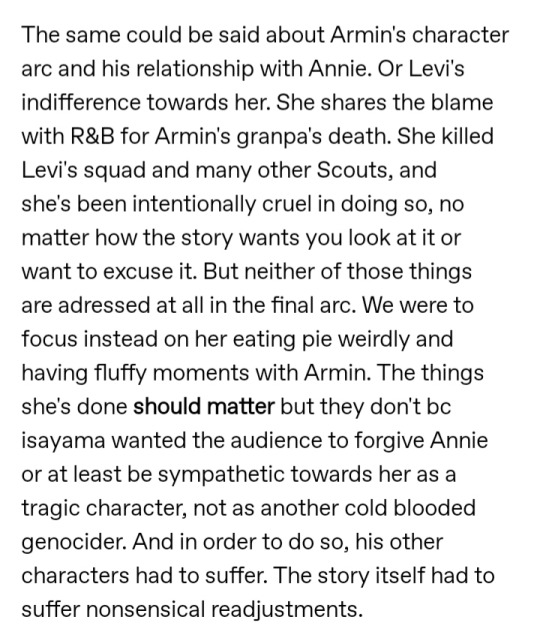
Marco, the Levi Squad, Sasha, and -- as victims of similar circumstances -- Pixis, and Hange, the embodiment of pacifism, were all condemned for being good people, and some of them for believing that there is good in everybody, even in their enemies; and punished for believing that conflicts could be solved in peaceful ways. Does the cautionary symbolism of their brutal deaths still holds up when the story rewards violence and crushes pacifism?
I don't think it does.
Showing that even the worst of the worst are capable of change and doing the right thing in the end is an important message, but. The idea that everyone is just a victim of their uprising or their circumstances is simply wrong. Ideologies don't exist without people, cowardice does not justify orders carried out that lead to attrocities. This idea fails to acknowledge that evil exists. Not just nuanced evil, but pure evil as well. It also goes the other way around. This idea also fails to acknowledge that good can exist.
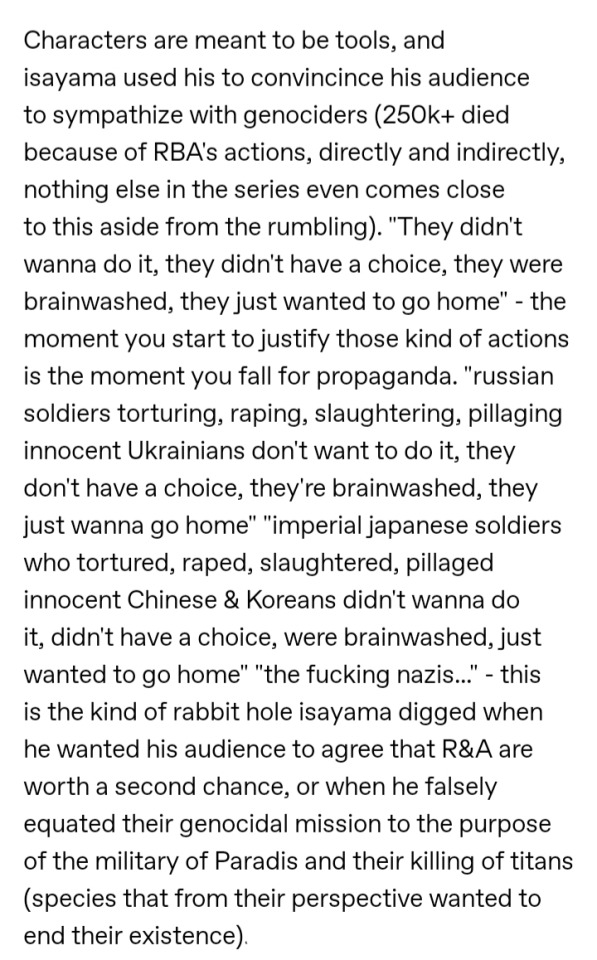
And also to sympathize with Pieck, who was still loyal to marley despite what they're doing to her own people. And Magath, who in his final moments, revealed that he actually cared about the kids he was indoctrinating and instructing to commit genocide all along. I can't ignore the similarity with the way neonazi like to bring up hitler's friendship with Bernile Nienau, a girl of Jewish origins, as an attempt to humanize him. Heck, even Zeke's final moments painted him as more sympathetic than he was. Such is the case with Floch, and the way Jean reacted to his death. All those characters were redeemed in the audience's eyes without facing any substantial accountability.
I also have a huge issue with the false equivalences that were supposed to show us how morally grey everyone and everything is.
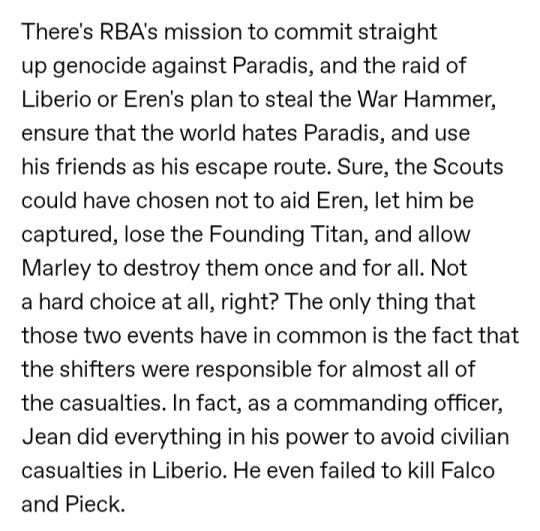
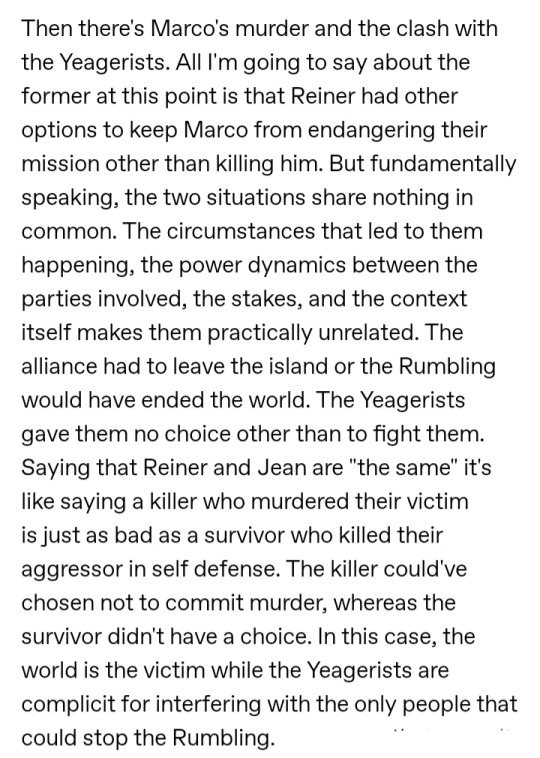
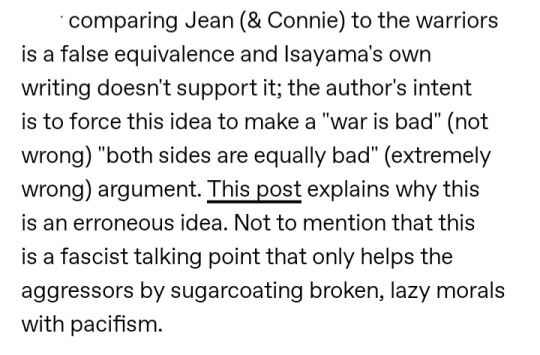
-> The link to the post in the screenshot
Jean and Connie and the Scouts that attacked Liberio aren't just wrongfully presented as something they're not, they're also used as tools to rationalize what Reiner and co have done to them throughout most of the series. Jean briefly does that with what Reiner did to Marco before he punches him to a pulp. Then again with the "we're the same" bs. Then again with implying Reiner is one of them as a Scout. There's also no real tension between the warriors and the Paradis side of the alliance. What the warriors did to Paradis is truly horrific, so their only way for redemption is through their victims.
The mistake that most people do when they interpret their relationship or the characters themselves is to only look at the characters' in-story intent. But there's also this thing called the author's intent that overrides everything. Sometimes, you cannot separate an author from their work. Especially when it comes to the final 12 chapters, where the quality of the writing is in the sewer.
But there's actually another way through which these characters were redeemed: the introduction of a much greater evil and a much horrific event that makes everything else pale in comparison. The main conflict of the story was revealed to have always been Eldians vs Eldians. But that wasn't always the case. Not until isayama retconned Eren, and then treated him the same way he treated the warriors. Eren's friends refused to condemn his actions, and instead repeatedly rationalized, then absolved and thanked him for what he did. It doesn't matter that they still did what was right in the end, that Mikasa killed him, or that Armin admitted they're both going to hell for the atrocities they've individually committed. In the anime. Which came out almost 3 years after the release of chapter 139+the extras and the massive backlash that followed. Let's not forget how that conversation went in the manga:
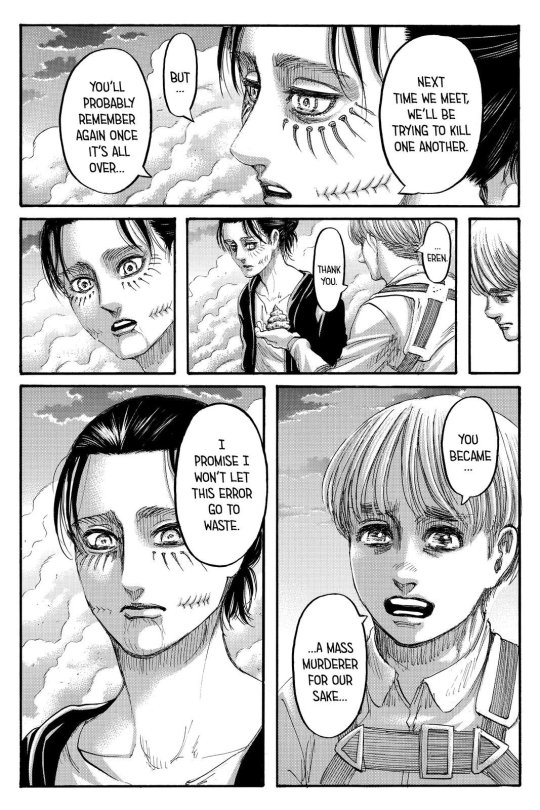
None of that matters because there's a dissonance between their actions & words and their attitude. isayama couldn't condemn any of his genocidal characters in a way that matters, in a way that would leave no room for moral ambiguity. But perhaps the greatest injustice isayama has committed to his own characters, story and messages was to retcon Eren, the character that was at the center of a message as powerful as the idea that we're all special because we're simply born in this world, into a genocidal maniac that cared about no one and nothing (if he actually cared about his friends, he wouldn't have put them through living hell, not when he actually had the power to prevent it, and if he actually cared about his mother, he wouldn't have killed her) through one of the worst executions of the time travel trope I've ever seen.
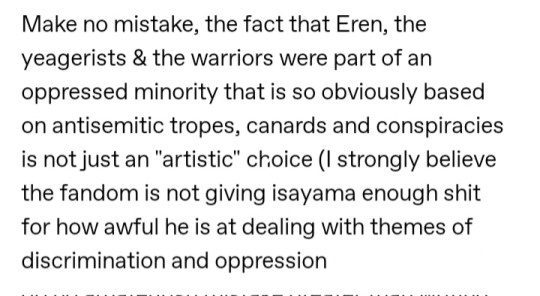
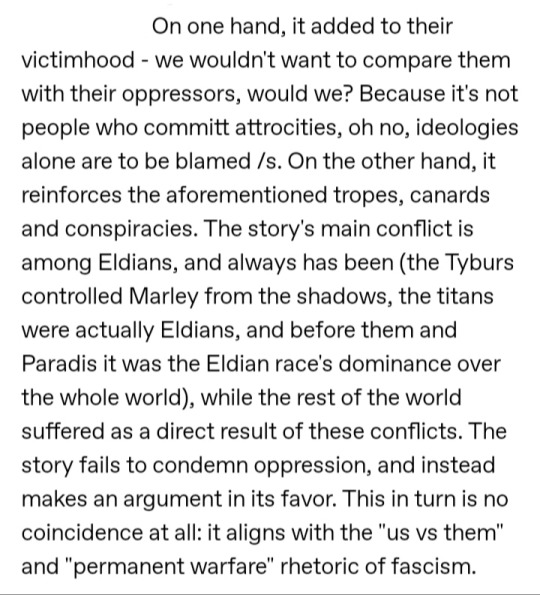
Snk is not a story that condemns fascism, let a lone a "masterpiece" when it comes to social or political themes, because it's centralized on justifying the oppression of the Eldians and making it an integral part of the plot. Not only are the Eldians an obvious metaphor for Jews, which is antisemitic on its own given how it's executed, but isayama ends up making them truly horrific because he takes real world antisemitic conspiracies and turns them into factual realities in his own story, all while seemingly acknowledging that Jews have been oppressed and the victims of the worst genocide in history. Moreover, the Eldians also seem to be ideologically inspired by imperial Japan, Paradis in particular. As @ shangyang points out in their essay, we shouldn't forget the fact that this is a manga authored by a Japanese man, nor that Japan has its own history with fascism. (Plesse don't skip any of the posts linked here)
All that being said, isayama's true intent is more than clear: violence is praised because his characters were written so to see violence as their only option, and the fascist mentality of eternal warfare as the status quo. Pacifism is not presented as an option. There's no nuance, only extremism. Even the cycle of hatred at the very end only serves as proof that the intent of the story is to present an extremely narrow worldview in which the human species is only capable of perpetual warmongering, hatred, destruction, and death. Which is wrong and is the very opposite of what I'd call "nuance", imo. And the reason this bothers me so much is because snk and other "morally grey" works alike aren't portraying evil people as just that, people, and evil as something that exists in all of us - no, what they're doing is making the unlikeable likeable, the unjustifiable justifiable, and they're making people sympathetic towards things they shouldn't be sympathizing. Such narratives are banalizing evil (if I had a nickel for how many posts I've seen justifying what Magath did or outright saying they love the guy, well I'd have a lot of nickels) and depreciating good (lots of nickels for all the posts I've seen bashing the Scouts). Such narratives serve as propaganda for the things they claim to condemn.
The result is that such stories beget ignorance, and ignorance is a fertile ground, whether is the case of people who are only interested in shipping and blorbofication, or the people who are not properly educated to know what they're dealing with.
And there's a reason actual fascists and neonazi are circling the series like flies, identifying with the yeagerists, and saying that "Eren was right". They're not taking control of the narrative, they're seeing it for what it really is. The progression of Eren's character arc, his motivations, the retcons, the conclusion of the story, Ymir's motivation, the undeserved redemptions, the characters not behaving in ways they should based on their history, none of those things make sense because they don't have to make sense. They're only pretexts meant to mask the actual intent of the story. The cycle of hatred didn't end because the rumbling truly failed. Because "the enemy" (the people outside Paradis, all of them, as Eren made it very clear) wasn't completely obliterated. Because as long as there's "the enemy", there can't be peace. Fascists have a complex relationship with war. They don’t like it, but "the enemy" is always forcing their hand. The rumbling was meant to succeed.
This is not a cautionary tale for anti-fascists.
Snk is a cautionary tale for fascists.
Now recontextualize all of that in present-day fascist politics, and see where it takes you. But ofc, this is only my interpretation, based exclusively on the story itself.
#i finally finished this thing#there are likely other issues i forgot to talk about but it doesnt matter cause this post is already too long#what matters is that im freeeeeeeeee#aot#snk#anti isayama#anti aot#attack on titan#shingeki no kyojin#aot meta#tw antisemitism#anti warriors#pro scouts
49 notes
·
View notes
Note
huh what was your rant’s main argument
this post is in no way a proper response to katie's response, so i just wanna make that clear from the start. i am actually going to make one of those. so this is not that.
the main argument of my rant is not "here is a list of keefe's worst qualities, doesn't he suck? now everyone point and laugh what a shitty/annoying/cringe/whatever-else-i-said guy" (well, except for the stuff that i said was subjective, like his humor). the main argument of my rant is that keefe's worst qualities never. impact. how. he. interacts. with. the. story. not a single flaw of his has any consequences, either plot-based or relationship-based. not a single bad moment redefines him in the audience's eyes (or is meant to, as written by shannon) or in sophie's. not a single shitty height he reaches has ever ever ever ever been portrayed as negative for longer than zero point four seconds. not one thing he does has any lasting, negative consequences, not for him, not for the people around him. not one thing. not one single thing.
the thing that confuses me about katie's response is that she is well aware that this is my main gripe with keefe. i am not silent about it in the slightest. i do not care that keefe uses his empathy dubiously. i do not care that he handed the cache over at the end of neverseen. i do not care that he breaches boundaries, or that he humiliates sophie constantly, or that he's infinitely stupid and reckless, or that he can't be serious during serious moments. serious. do not give one single shit about any of these things.
what i actually care about, my unending problem with keefe's character, my main gripe, the thing that will never stop annoying me about keefe, is that these things do not result in keefe facing any consequences for doing them, nor are they even villified by the narrative.
i understand that keefe's dubious use of empathy is because of his father. i know that he ran away to the neverseen because of his mom's manipulation. i get that he breaches sophie's boundaries because he genuinely might think he's helping, and that he humiliates sophie because he doesn't know when to stop, and that he's reckless and stupid because that's his character flaw and because he's trying so hard so fight his mom and make sure she doesn't hurt anyone else, and whatever else katie pulled out in her response to explain keefe's shitty behavior. i am aware. i know this. i am not trying to argue that keefe is a bad character because he has flaws and does bad things. that would be incredibly weird.
no, my main argument is that keefe's flaws do not function as flaws, but rather just as bad traits that, half the time, shannon herself does not seem to even be aware are bad.

here is a fantastic example. okay here goes: keefe has issues regarding not knowing where the boundaries are with empathy because he grew up with his fucked-up abusive father who likely extorted information out of him the same way he does with sophie and others (and also likely because he's brainwashed into thinking the law is moral, and there's no actual law against doing this).
now that i've passed katie's test, let's play my game: name one time keefe's using his empathy has, in the long-term, affected his relationships with people. name one time it's truly demonized and made out to be a bad thing by the narrative beyond "oh the person was angry and muttered something about empaths or glared at keefe". name one time it actually affects how keefe interacts with the story. name one time this flaw, something both katie and i agree on, actually affects keefe's relationships. name one time he's sorry, name one time he learns or grows out of it, name one time it's even just made out to be a shitty thing, and not in a "oh, that's just a thing keefe/empaths do, isn't it so annoying? oh well, guess we'll all just put up with it". name one time this flaw is actually recognized by shannon as a flaw. name one time. name one single time. name it. i want to hear it.
in theory, this is supposed to be a thing the reader keeps in mind as they read all my points. i think i actually did say after one of my points something to the effect of, "i'm not actually mad about [thing], it's just that keefe never faces consequences for [thing], which does make me mad. this is also something that applies to a lot of points i make, but it would get repetitive to say that after every single point i make, so just keep in mind that that's the angle i'm coming from". maybe it wasn't as clear as it was the way i just said it now (which i will keep in mind and change during the part two rant), but yeah. none of my points are meant to be "oh look at him isn't he so [flaw]" and stop right there with no further thought. they are meant to be proof that whatever keefe did is bad, so that when i get around to the back half of the rant, i can then say that [bad thing] is never developed or even made out to be bad. so, uh. yeah. here's a few times i say this in the rant itself:


also wanted to mention this quote (from katie's response):

the reason keefe reads as flat to me is that none of his flaws ever affect how he interacts with the story, not in any long-term negative-consequence sense. you can explain and over explain why keefe is the way he is all you want, but that will never change the fact that this is fully not at all my gripe with keefe. not even a little bit. explanation does not equal justification, and certainly it does not equal consequences. where are the consequences, shannon. where are they. where. where. i don't see them. i don't think they exist, actually.

YES!!!! EXACTLY!!!! IT DOESN'T JUSTIFY IT, IT EXPLAINS IT!!!! THAT IS EXACTLY WHAT I'M SAYING. YES. YOU GET IT. so you agree that this is shitty behavior. okay, cool. now name the place where keefe gets what he deserves for this. if this is shitty, it follows that it is a flaw, right? and if it's a flaw, it should be penalized, right? it should be made out to be a bad thing, right? now. where does this happen.
katie also makes a lot of arguments like this:

well, i actually did acknowledge fitz's main flaw at one point (exile incident, there's a screenshot a few paragraphs up), and i actually did explain why i don't think other characters (in this case, fitz) tend to be as bad as keefe. it's because there's actual development there with fitz's anger, and even if there wasn't, it's definitely vilified by the narrative. (i'd also like to say that katie responded to the bullet containing that fitz-from-exile section, but for some reason decided to cut out that section when quoting me in her response. i felt that was an important part of my argument, and that therefore its absence diminishes my point. in theory, this should not matter, but in reality, there are clearly people that are reading katie's response without reading my original post, and making judgement calls based on that.)
in conclusion, katie has made an argument. a good argument, even. one i actually mostly agree with, which is why i'm having such trouble writing a response to her essay. it's just that what she wrote is not (broadly speaking) a counterargument to what i wrote. it disproves nothing of my main point. nothing katie has told me is new information. i've read her pro keefe essay, which she knows. i'm aware that for everything keefe does that is shitty, there is a reason. genuinely it almost feels like an insult to my intelligence to imply i'm not aware of these things, especially considering shannon has a tendency to beat us over the head with the keefe pity party. i know why keefe is or does [insert flaw here]. i know exactly why it happens. i am aware. that does not change the fact that explaining why it occurs does absolute jackshit to change the objective fact that keefe's flaws are usually brushed aside or made out to be way less offensive than they really are. and honestly, if a flaw doesn't affect how a character interacts with the story, can we even really call it a flaw anymore? at that point, it's just a bad trait.
#this is far from the only gripe i have with katie's response. it's just the main one. hence why this needs to be a proper thing#some of katie's anons are genuinely giving me the vibes that they read katie's response but not my original argument#because katie is arguing/proving something that i agree with. fully missed what i was (mainly) saying#although to be entirely fair i talk about that way more in the back half of the rant. so maybe she just hasn't gotten there idk#anti keefe sencen#kotlc#asks#anon#sorry for the discourse people. all my posts will be tagged anti keefe. for blocking purposes
23 notes
·
View notes
Text
Analysis: The Blood🩸& Lipstick 💄 💋
Let’s look at the symbolism, subtext, and suggestions behind Bruce’s blood stained shirt and John’s ‘borrowed’ lipstick from Harley.
1) 🩸 Blood on Bruce 🩸

Symbolism
John and Bruce’s much anticipated confrontation in the Bonus Brothers Carnival ends with a pivotal question, which is, does Bruce trust John? John who is covered in blood, surrounding by bodies, and acting erratically. If you pick ‘Yes’, John embraces Bruce which leaves the vigilante with a bloodied shirt.
Many people have picked up on how Telltale utilises visual storytelling to indicate the shift in the narrative here, and more so the shift in Bruce’s character. Bruce has ‘blood on his hands’ both literally and figuratively— now this symbolism alone depends on how you interpret John’s character as a whole in addition to what you think actually took place off screen between John and the Agents.
But aside from the idea that the bloodied shirt symbolises how Bruce is now complicit with John’s crimes (‘murder’) I thought about how it also plays into the ‘same stitch’ mantra which John says throughout the narrative.
Blood holds a lot of meaning; It can symbolise tight connections between people, for example when we refer to terms like 'blood pact/blood oath' as gestures of trust, loyalty, and commitment. These associations are very intimate and how they link to John's mantra is through the very forced nature in which the blood is transferred onto Bruce. John pulls Bruce in for a hug, taking him by surprise, as is evident by Bruce's stiff posture. And that's important because from the very minute we meet John, we see how he ‘pushes’ idea's onto Bruce, or subtly forces him to make tough decision. (relative to how you play Bruce, in this case, I mean when you play Bruce as a 'good' guy).
Let's look at Lucius's funeral; John tries to pressure Bruce into meeting his 'friends' by either guilting him into it, “Please, I’ve got a lot riding on this.” or incentivising Bruce to do so via the reveal that John has links to Riddler, “I’ve got this enemy. Calls himself, the Riddler”.
In a way, the blood on Bruce's shirt is also an attempt to reaffirm John's belief that they are “two threads in the same stitch”.


Theories - Was it an accident or was it intentional?
I've thought about how John may have deliberately hugged Bruce so that the blood on him would imply that he was also involved with 'killing' the agents, and you could see it that way when rewatching the scene. Especially with the above image (left) where we get that shot of John's face. That expression occurs directly after he apologises for getting blood on Bruce.
John's expression doesn't look apologetic and we know how he looks when he genuinely regrets an action, or is in a tough position.

So his face looks otherwise neutral to me. Or at least the shot seems to linger just slightly. To top it off, there's no response from Bruce because John quickly reminds Bruce that they need to catch Harley, which is interesting because every other option during the Hug scene seems to take its time, and there's no sense of urgency from John like there is in that moment.
So maybe it was intentional.
However, since it's never brought up by Waller, or has any real consequences to the plot, I just consider it a fun theory. Mainly because I think it could've also been a genuine moment - John looks visibly surprised when Bruce says, "I believe you" and it seems like a knee jerk response from him especially considering how often the game makes you doubt John by making so much of his words and actions look ominous. (Although that could all still very well be true, that he isn't always to be trusted) For the sake of Bruce and John's dynamic, I like to believe it was a genuine moment of tenderness between them, especially if you choose the option where Bruce apologises for doubting John during their hug.
2) 💄 Shared lipstick 💄


When John goes down the Villain path, the events on the bridge is where his transformation occurs, hence the lipstick he gets from kissing Harley.
It even foreshadows Joker’s look. [refer to this.]
Now, one interpretation I had of this scene was that John and Harley were finally on the same page because throughout their time together there was always this uncertainty surrounding their relationship, John himself questions whether his relationship with Harley is contingent upon whether or not she succeeds to get the virus.
In another sense, this could also be seen as the moment John steps away from Harley’s influence. John is the one who initiates the kiss with Harley here, and in contrast to when they make out during episode 5 at the dinner party, Joker doesn’t have residual lipstick from Harley there, so I like to think that he was more forceful on the bridge with her to intentionally get lipstick on him.
Since he’s been second to Harley and her plans so far in the narrative, I like to view the kiss/lipstick as an act of independence - a sort of taking - from Harley, and reclaiming a sense of identity for John.
#batman telltale#telltale batjokes#batman: the enemy within#telltale john doe#telltale batman#telltale bruce wayne#joker#batman#dc universe#Harley Quinn#media analysis#batjokes#Juce#bruce wayne#reductive rambling#batman the telltale series#dc joker
41 notes
·
View notes